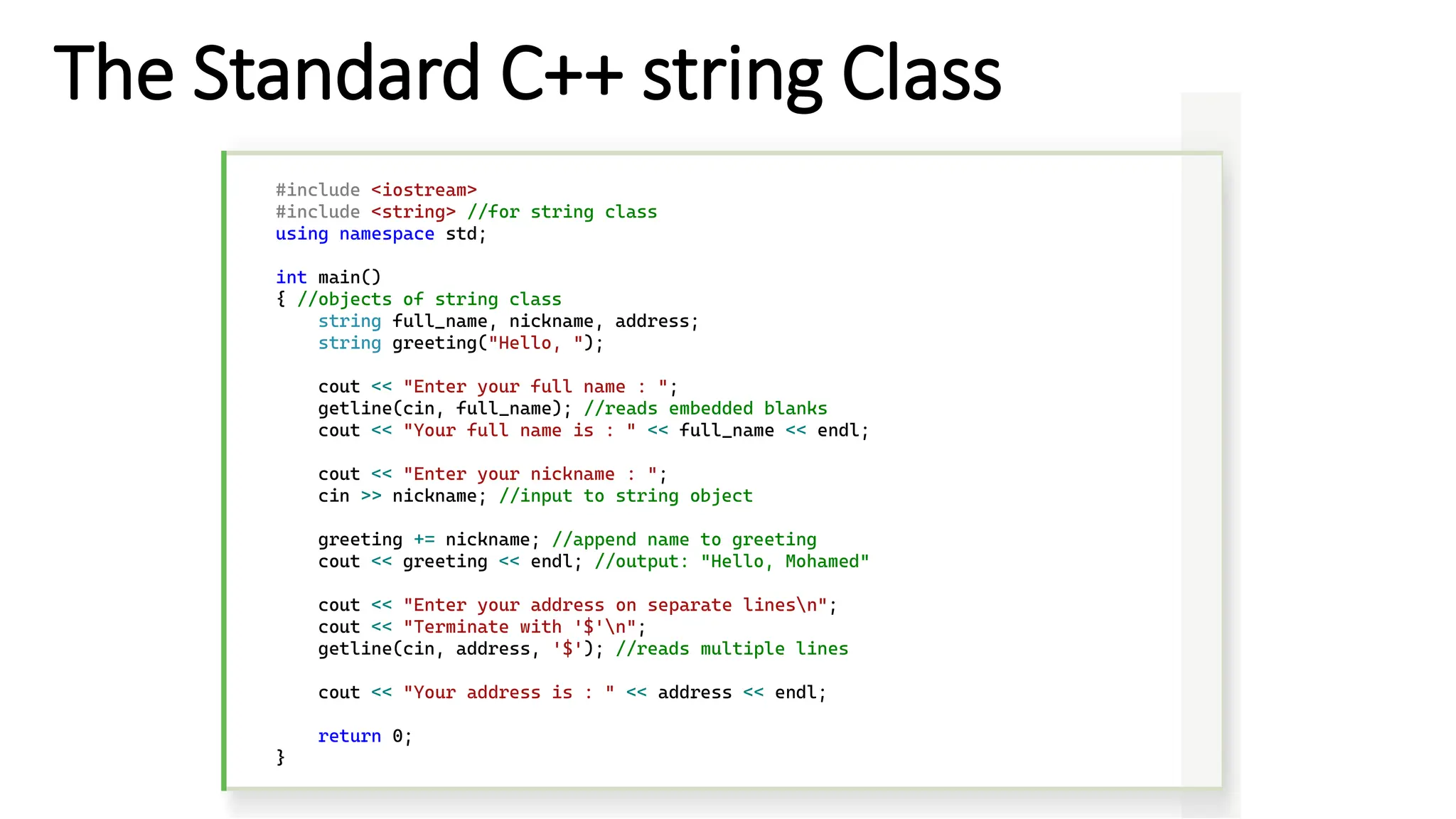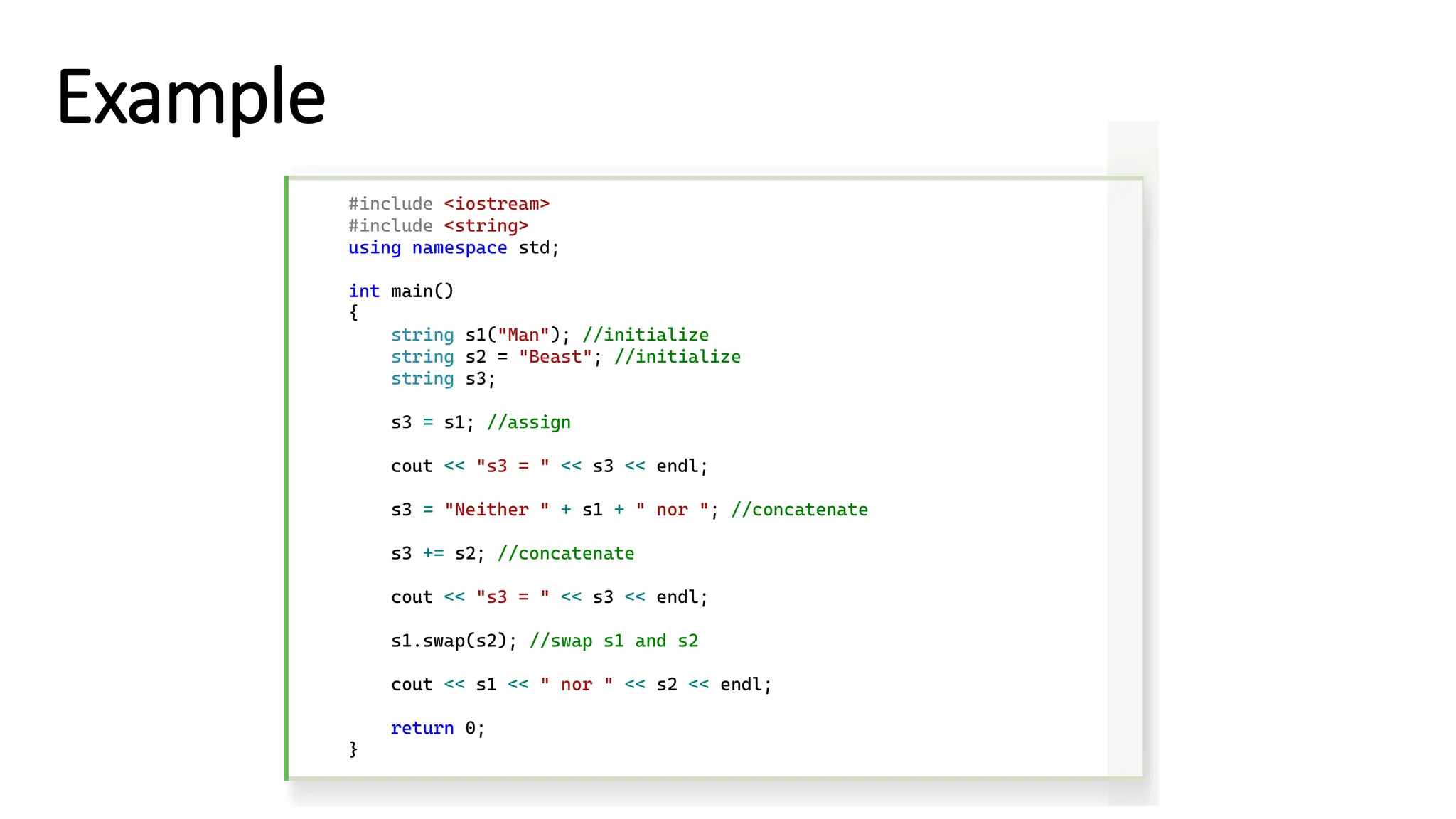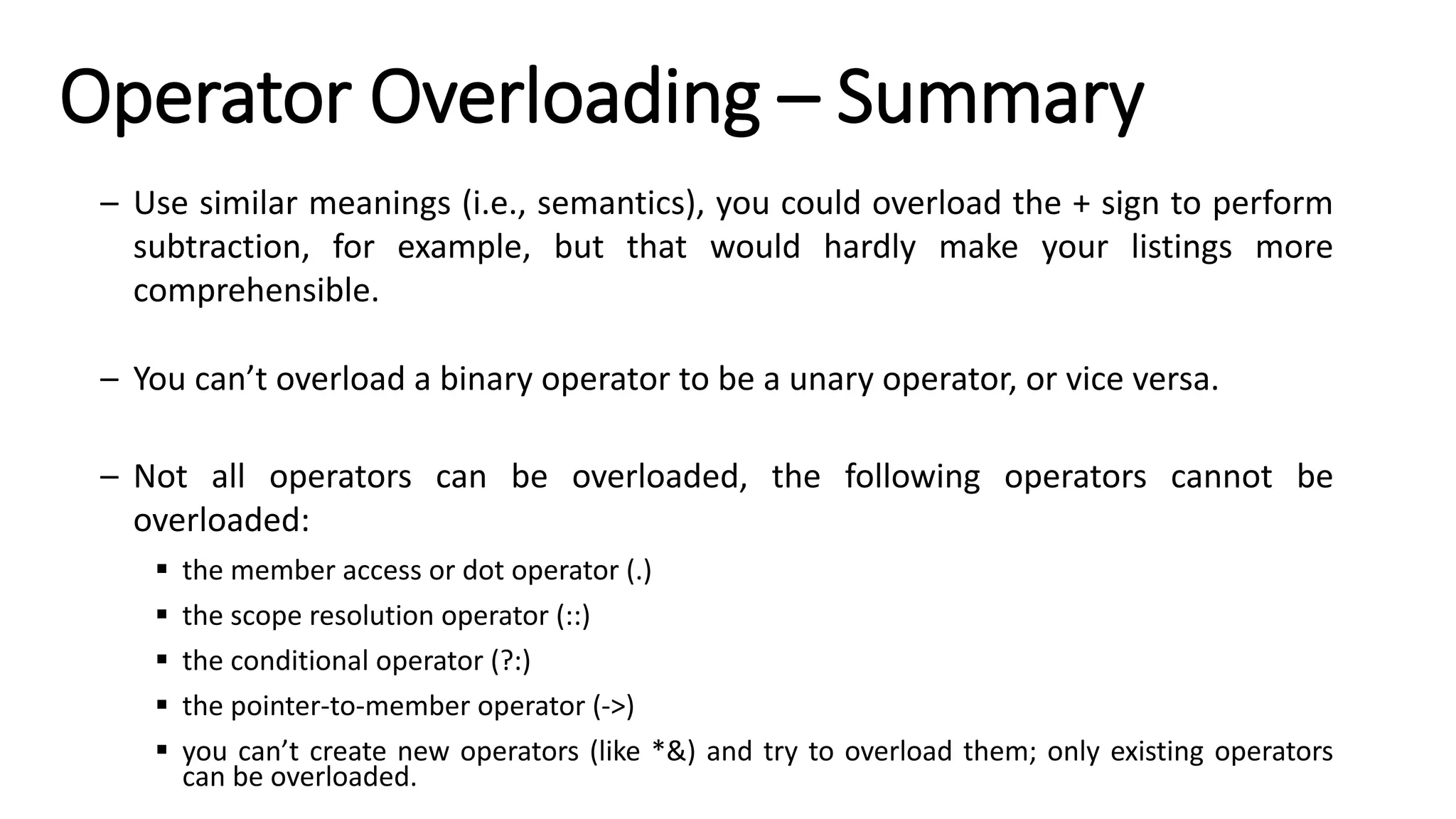The document presents an educational lecture on object-oriented programming using C++ by Mohamed Gamal, covering key concepts such as class definitions, constructors, member functions, operator overloading, and examples involving distance and card classes. It highlights the use of constructors with and without arguments, the significance of const member functions, and demonstrates string manipulation with the standard C++ string class. The content serves as a foundational guide for learners new to C++ programming and object-oriented principles.
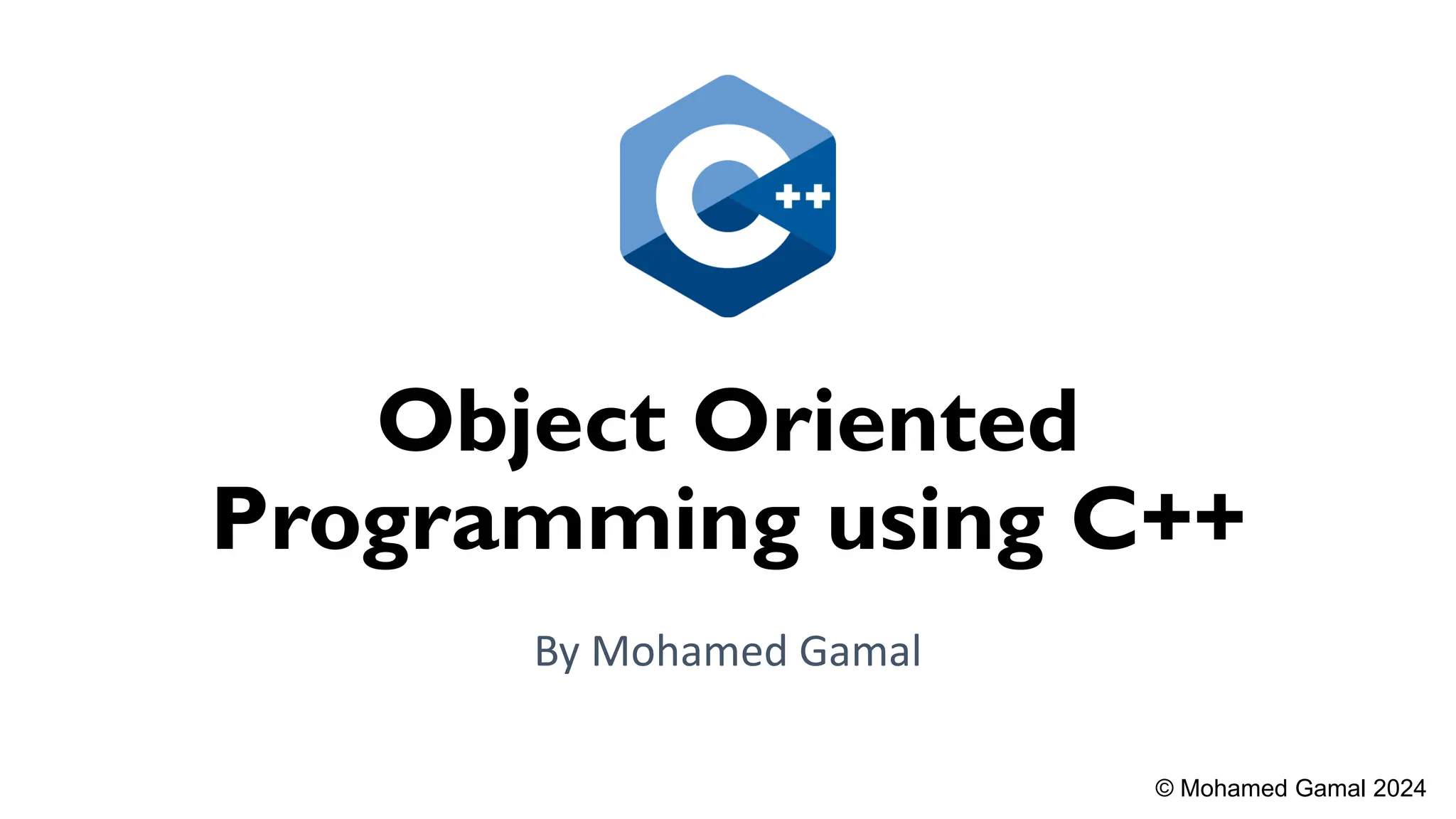
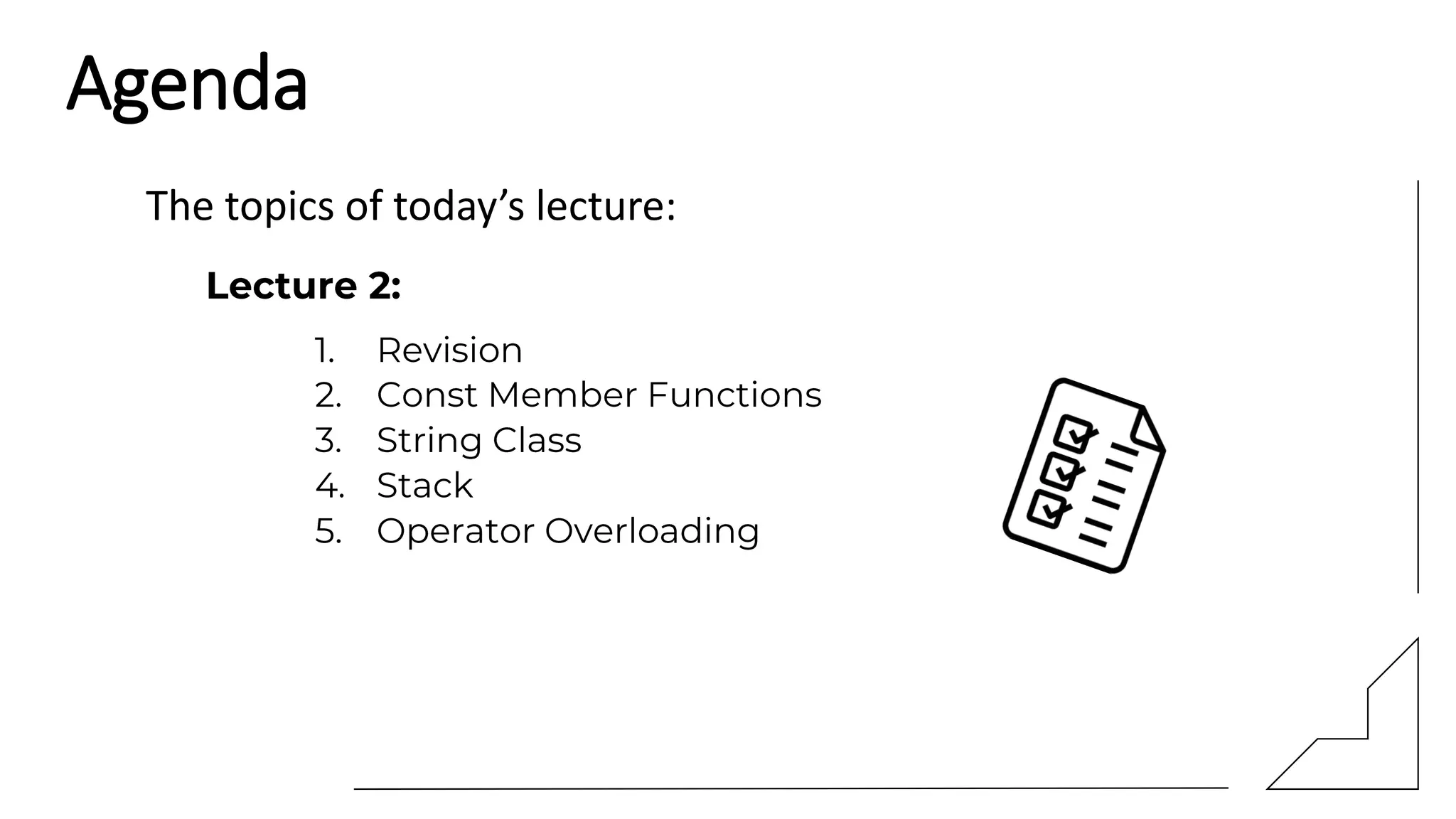

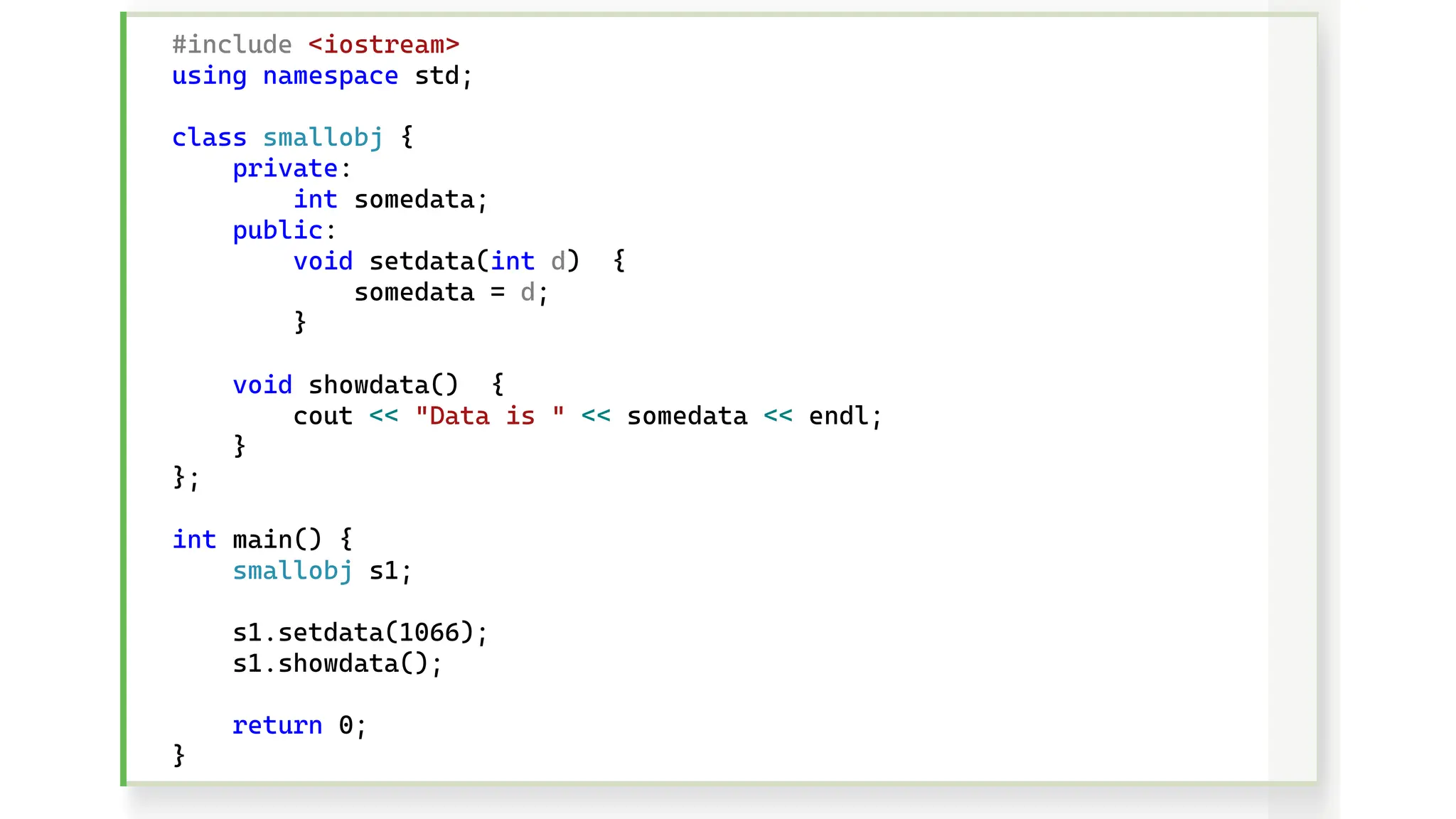
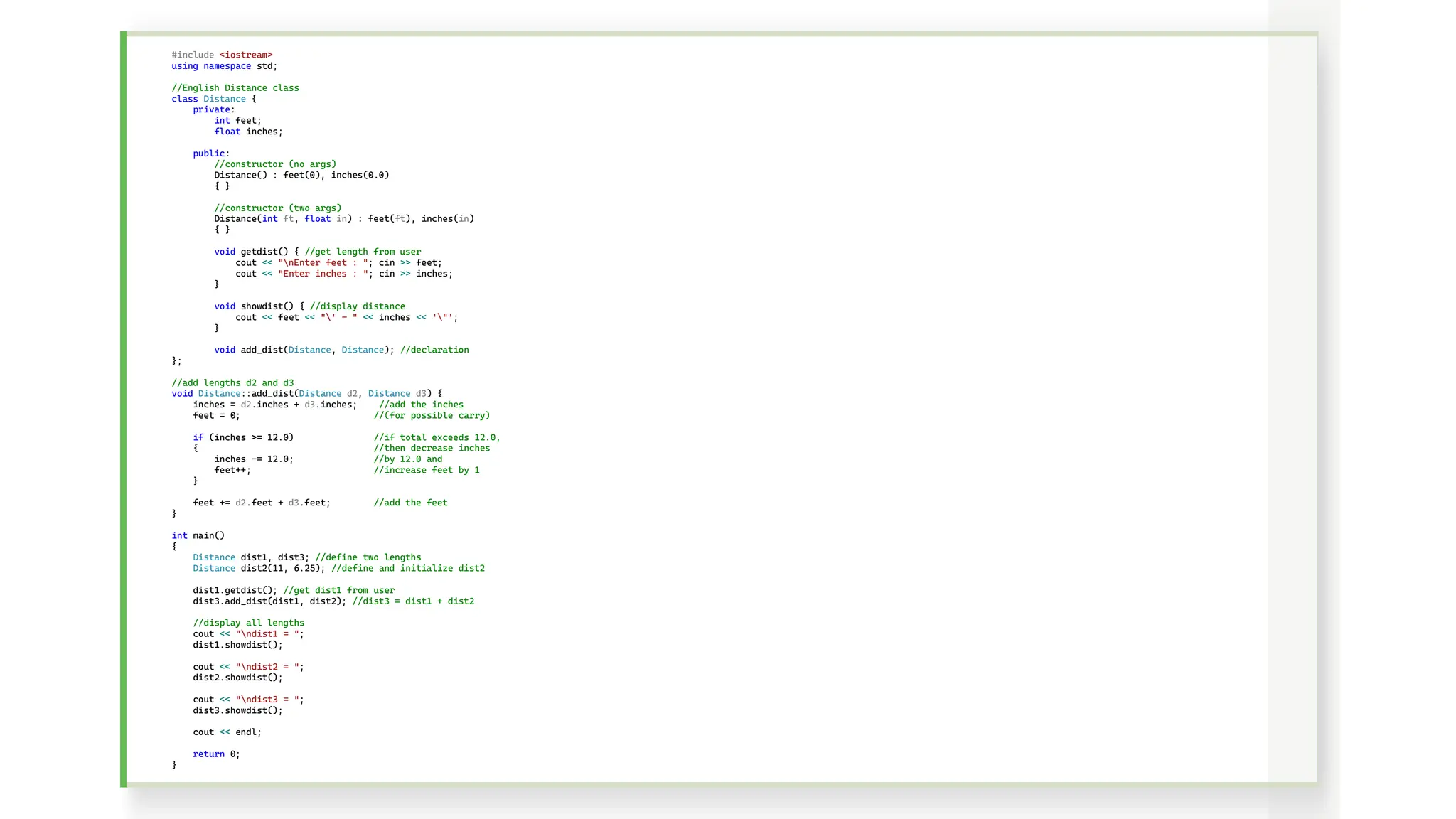

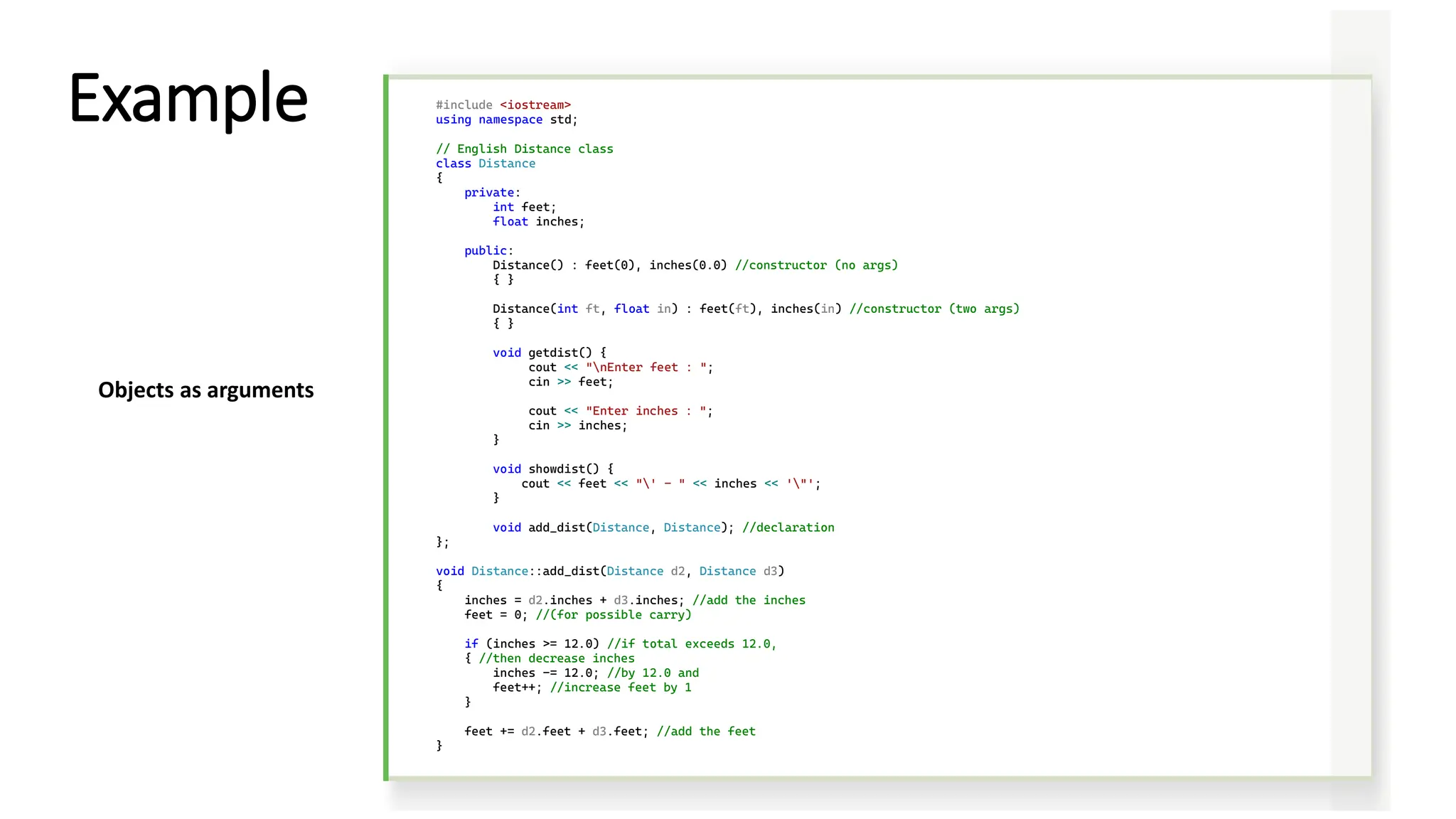
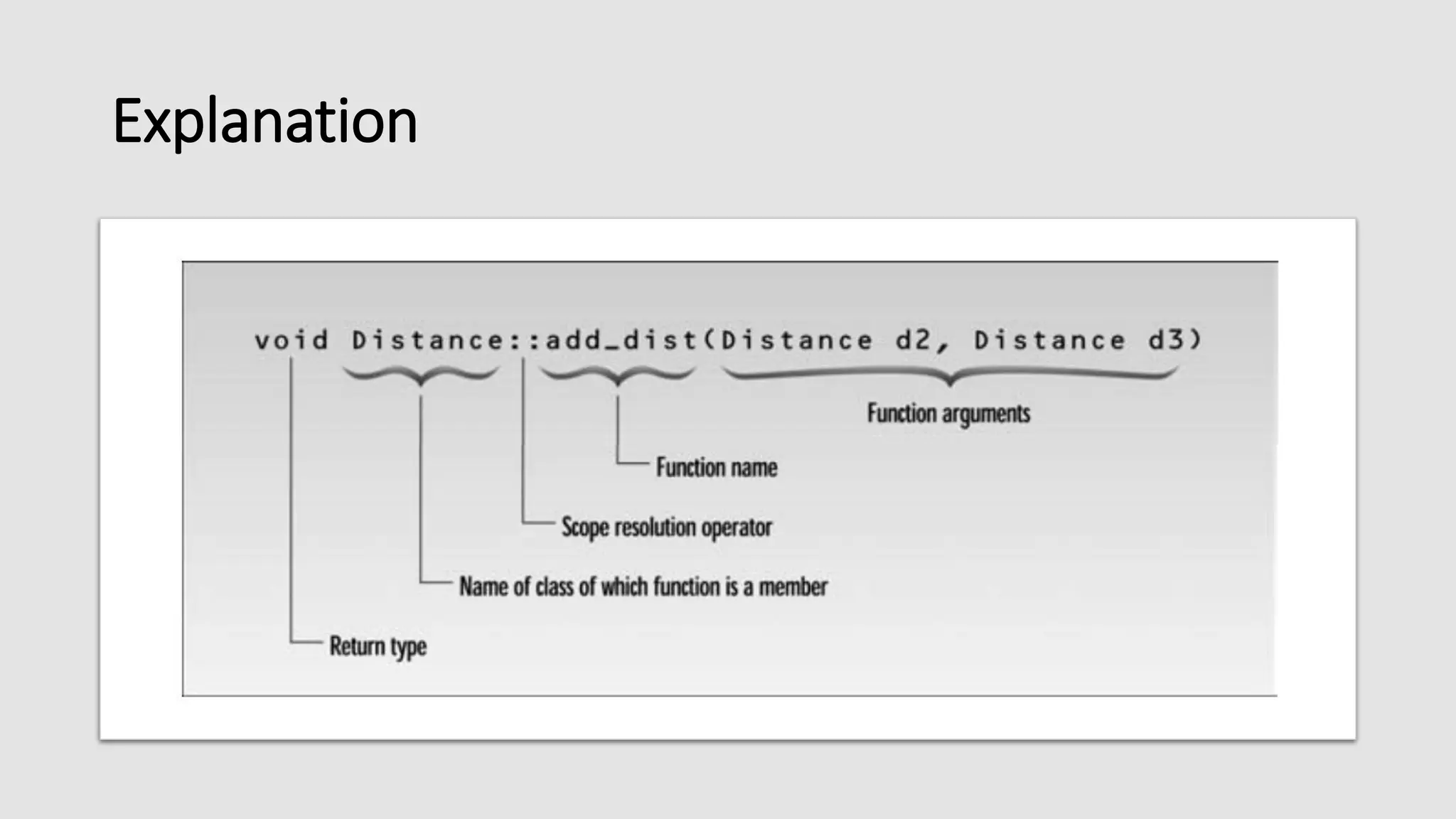
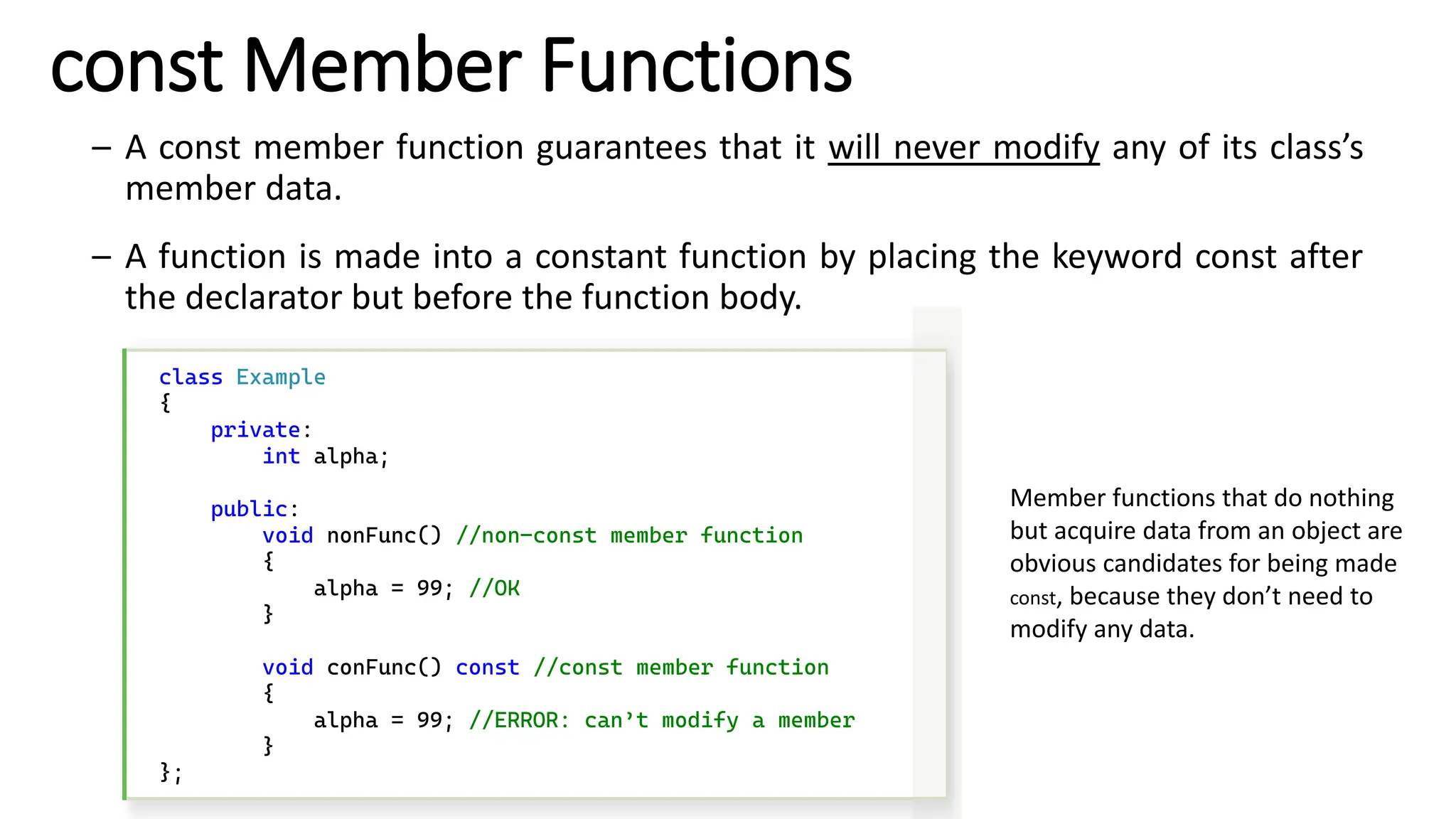
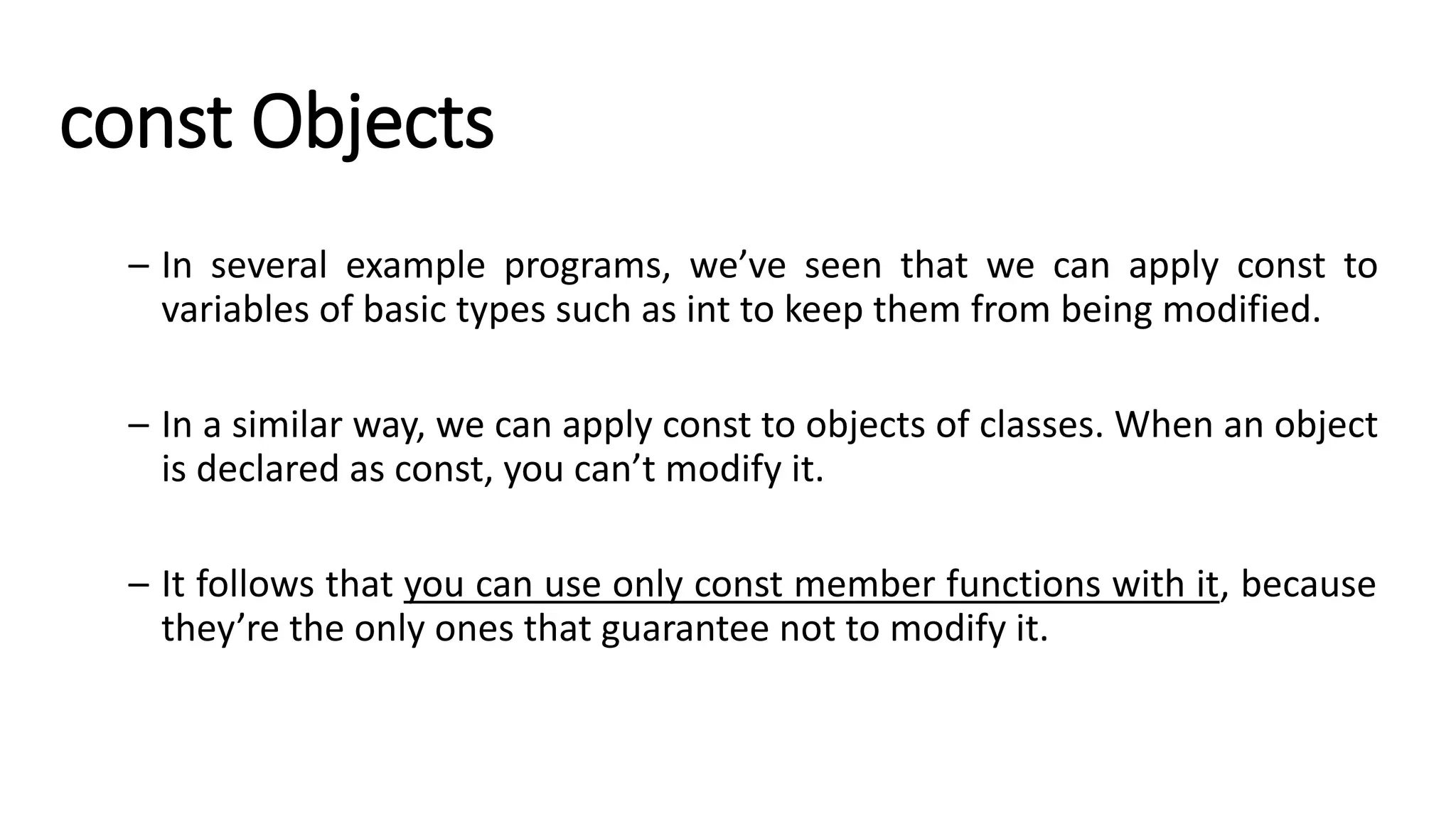
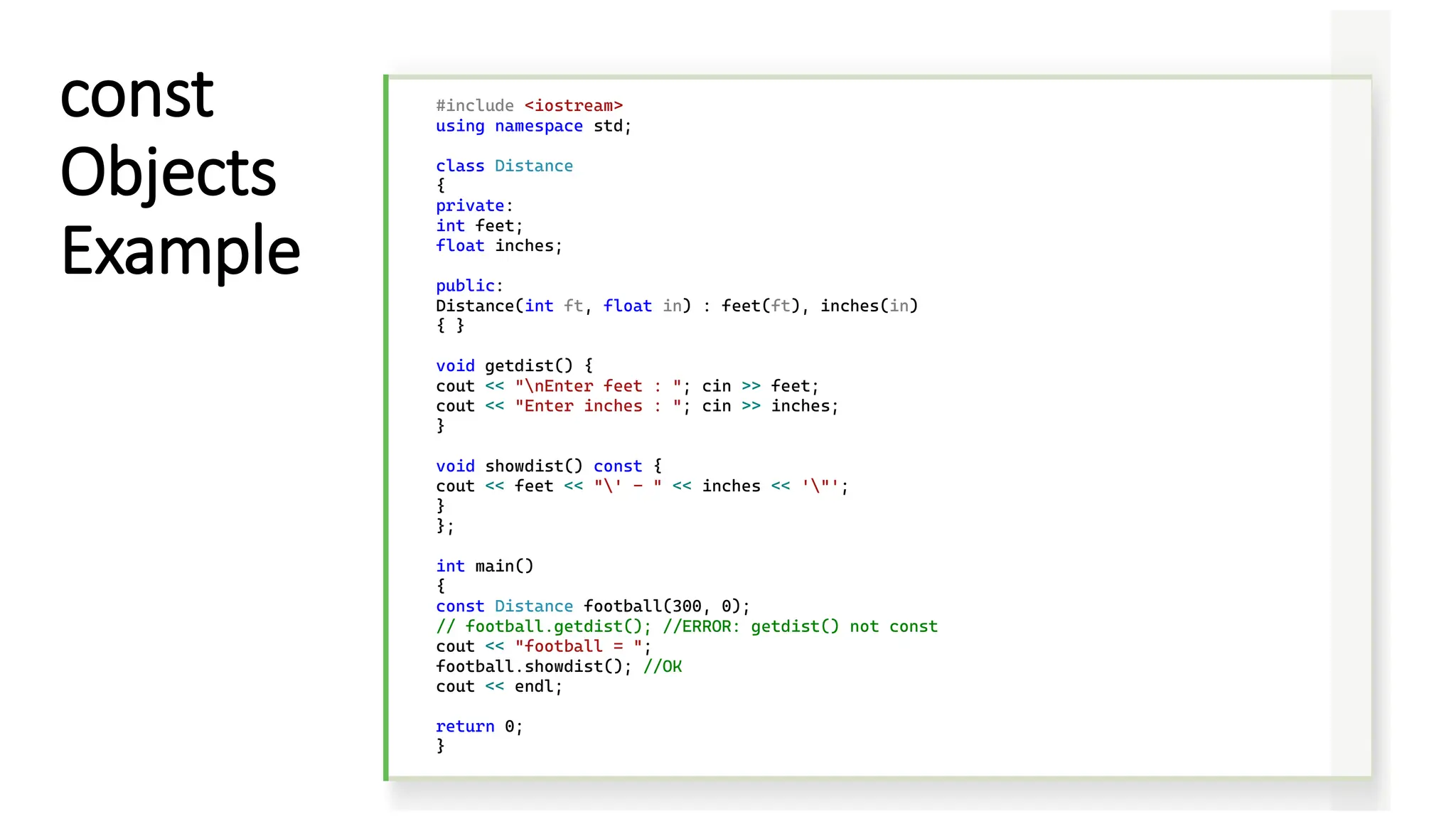
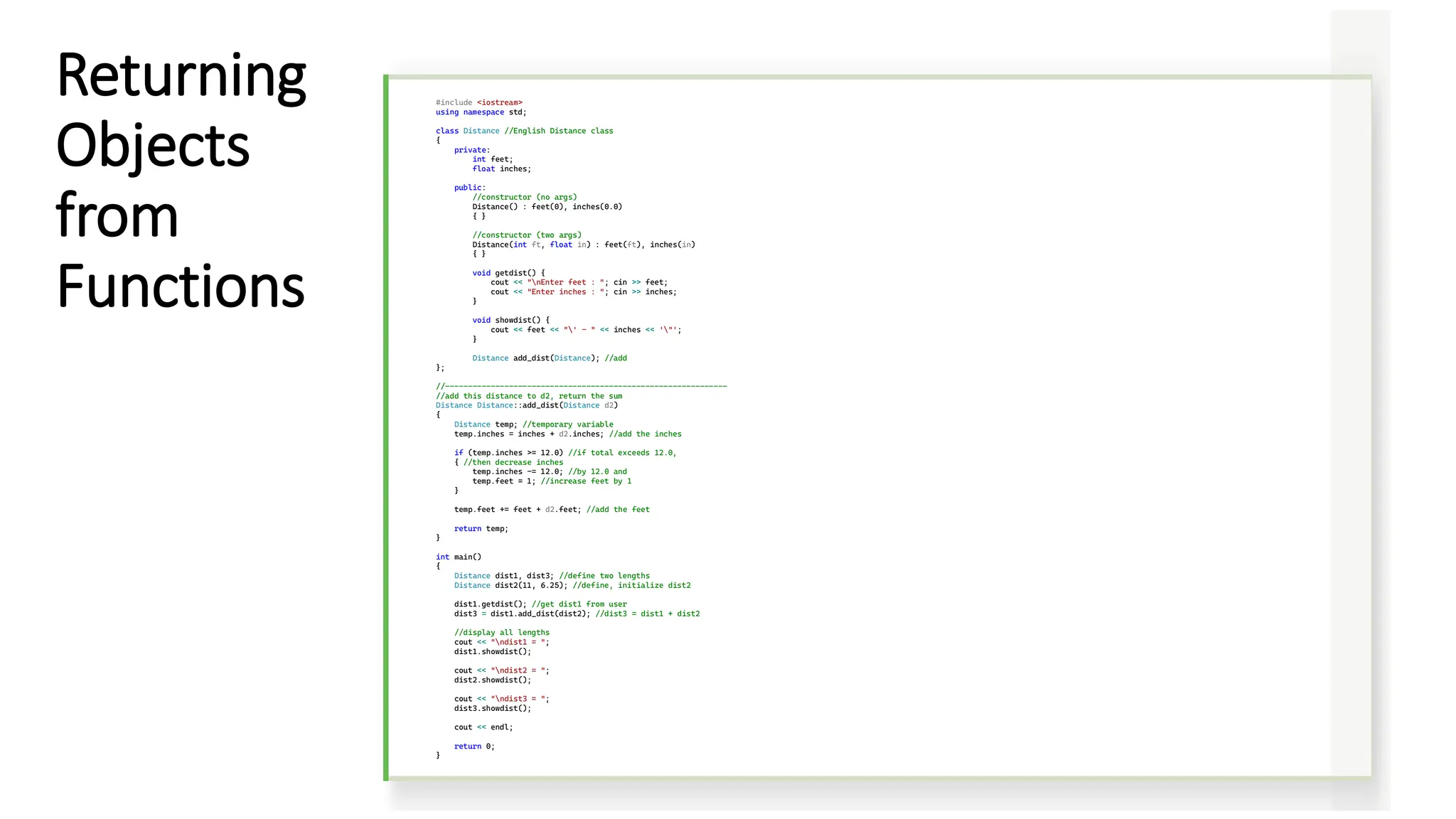
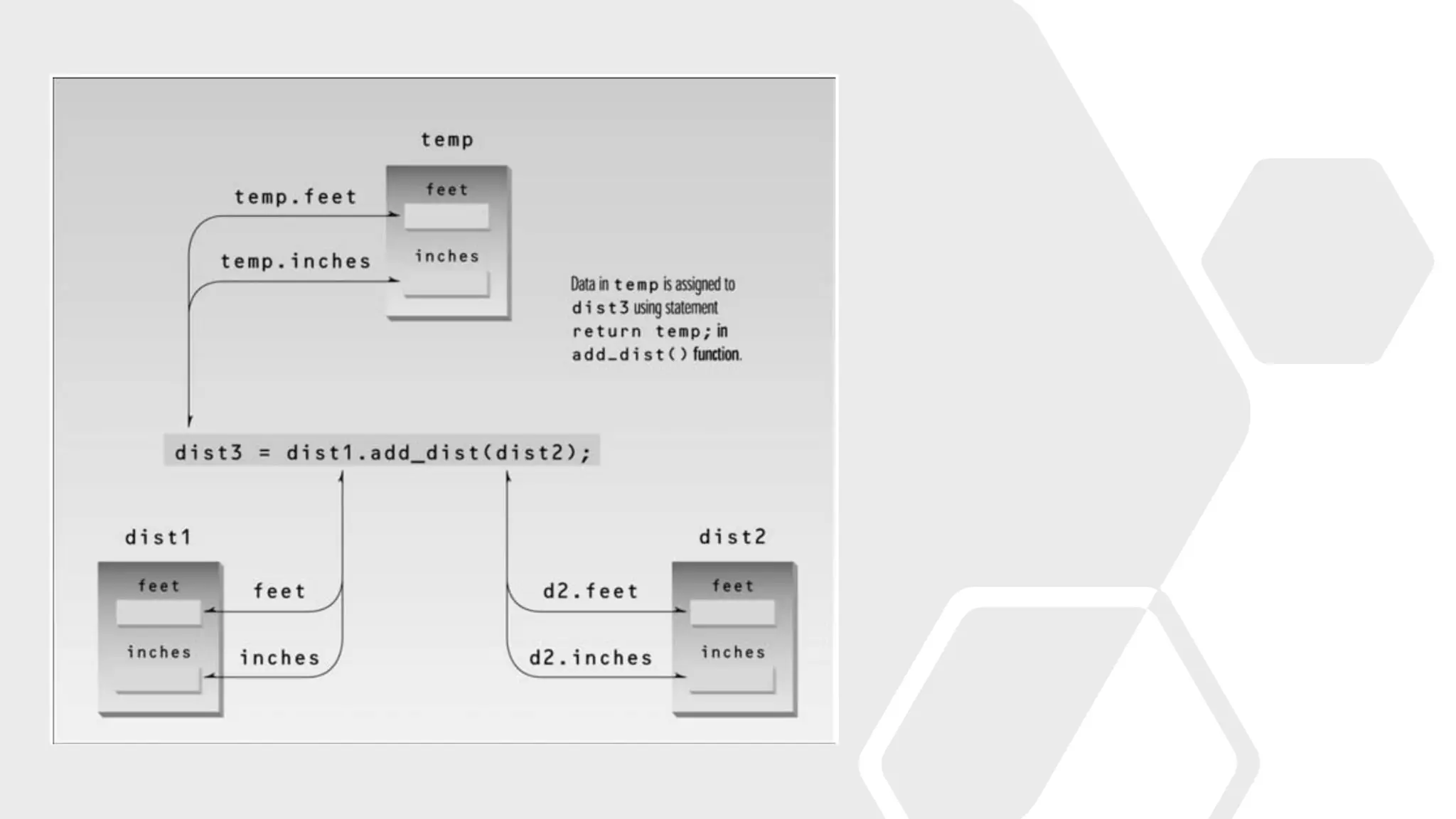
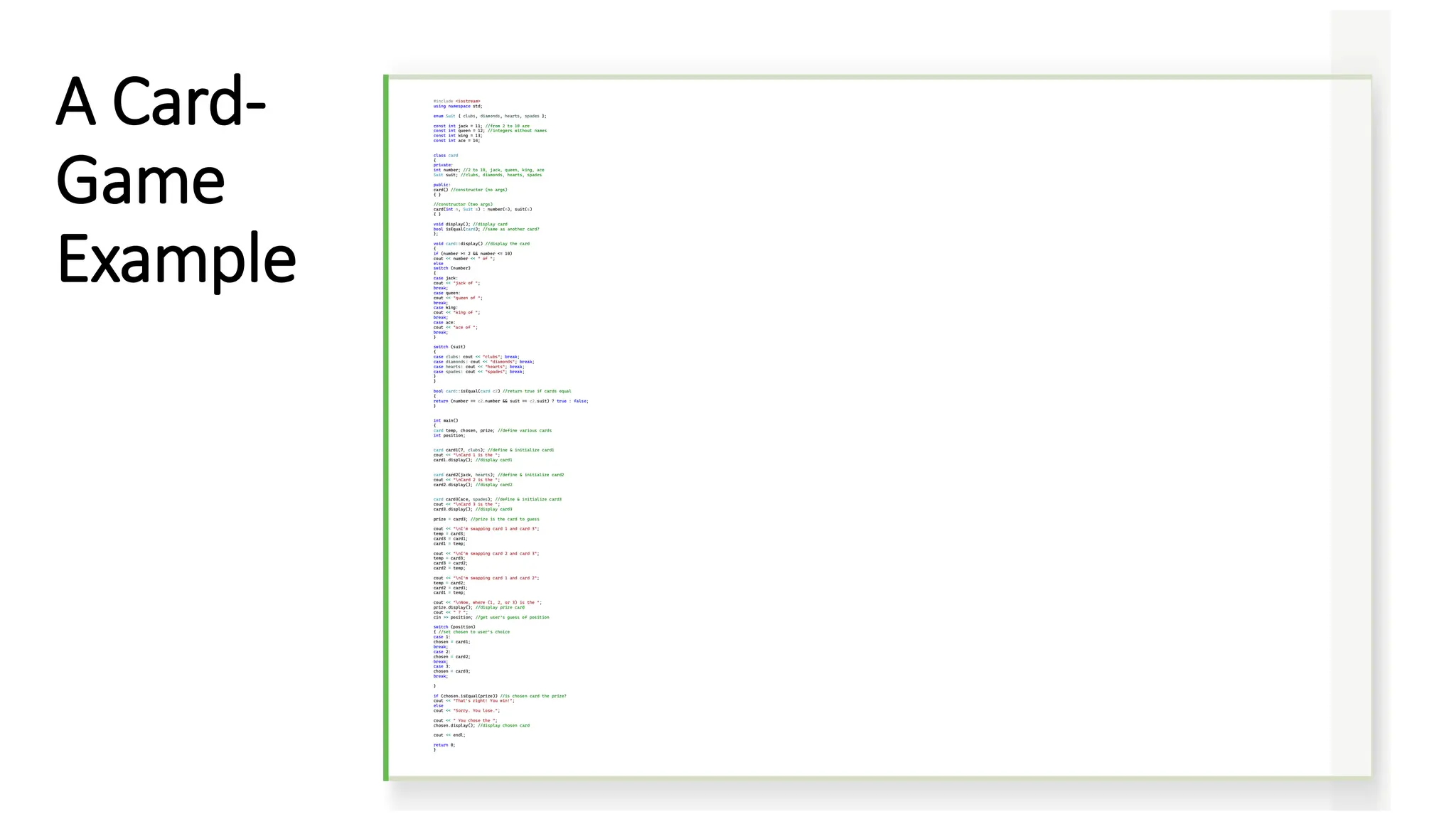
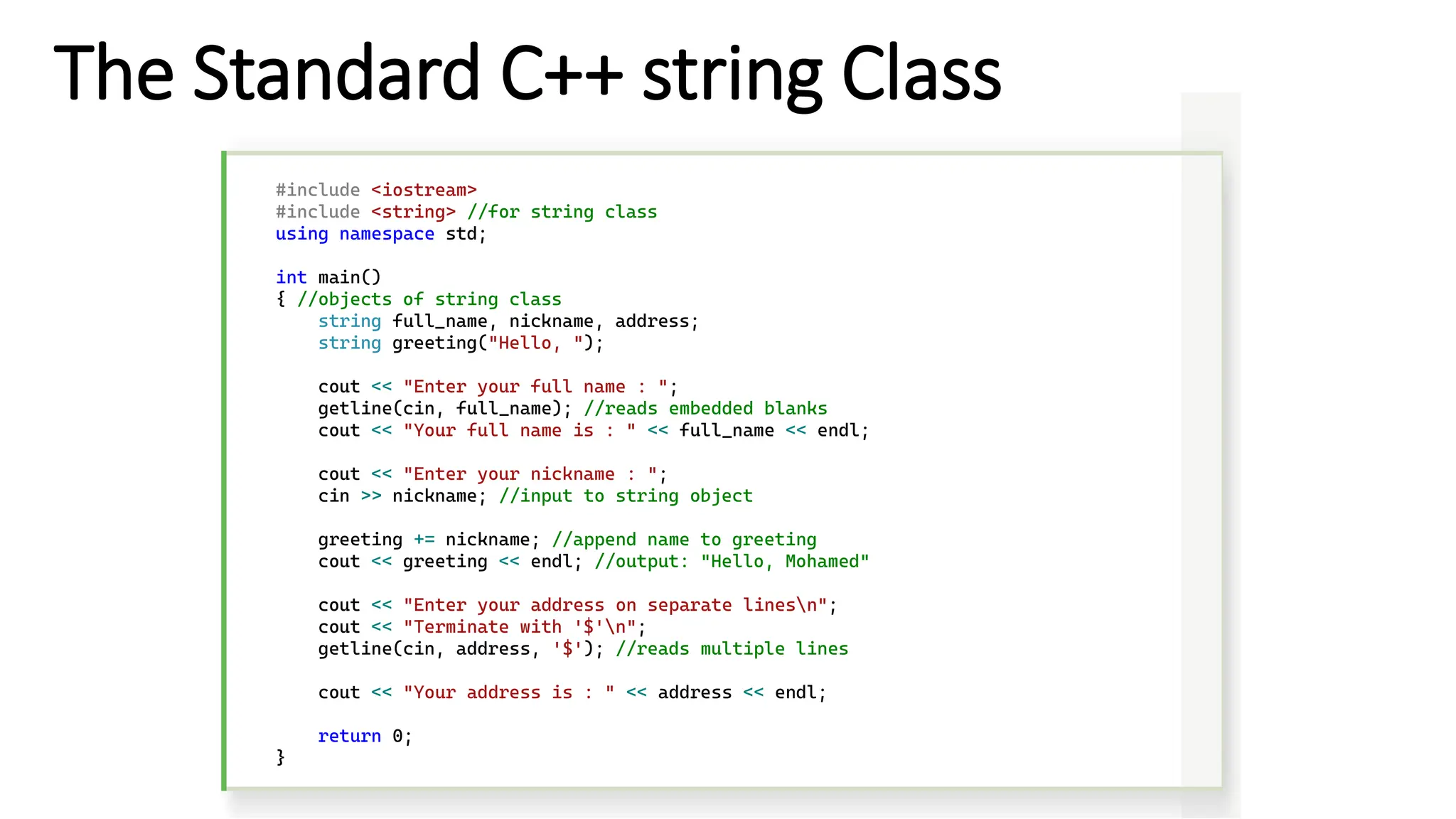
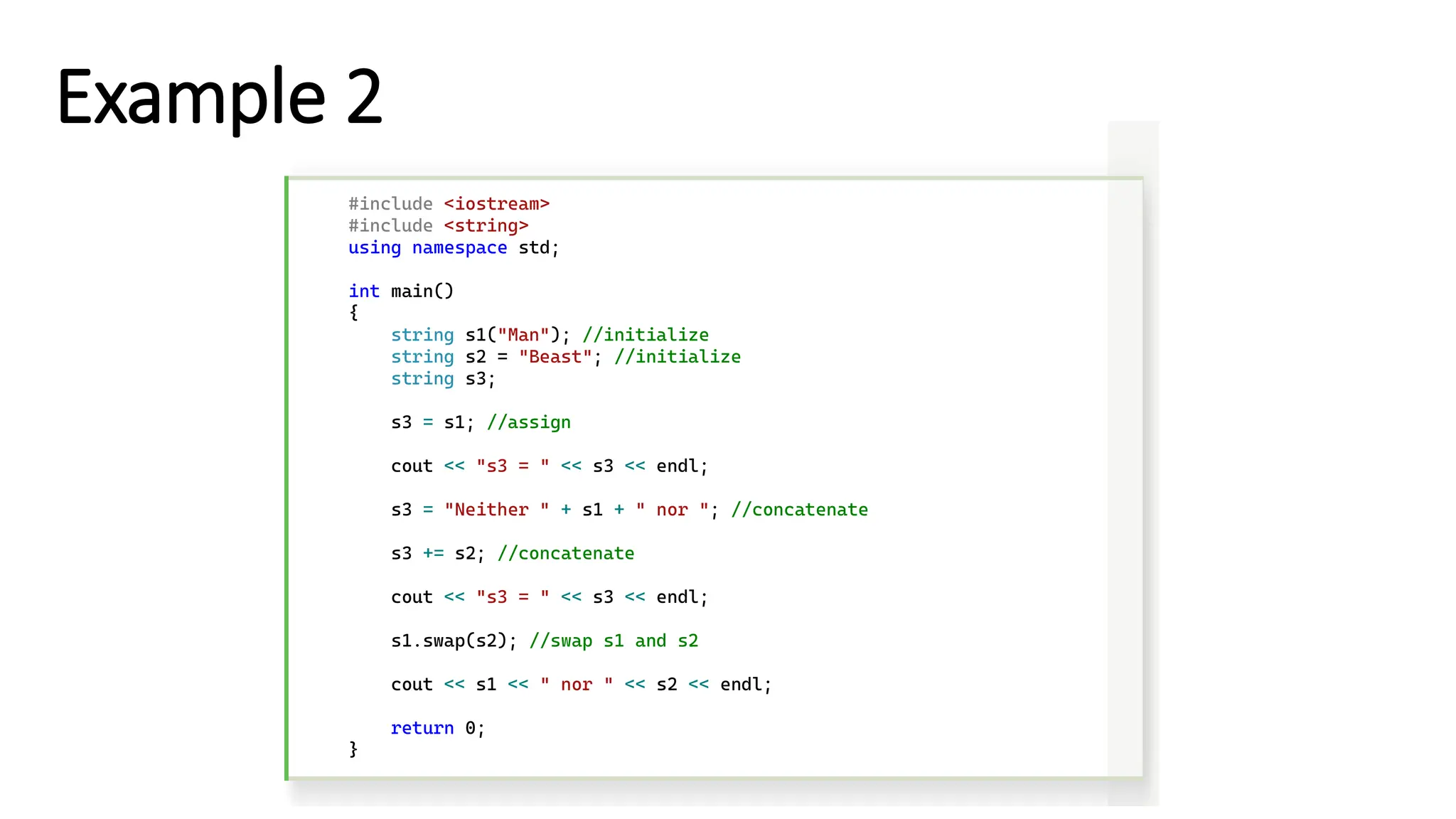
![#include <iostream>
#include <cstring> // for strcpy(), strcat()
using namespace std;
class String
{
private:
enum { SZ = 80 }; //max size of Strings
char str[SZ]; //array
public:
String() //constructor, no args
{
str[0] = '0’;
}
String(char s[]) //constructor, one arg
{
strcpy(str, s);
}
void display() //display string
{
cout << str;
}
void concat(String s2) //add arg string to this string
{
if (strlen(str) + strlen(s2.str) < SZ)
strcat(str, s2.str);
else
cout << "nString is too long!";
}
};
int main()
{
String s1("Merry Christmas!"); //uses constructor 2
String s2 = "Season's Greetings!"; //alternate form of 2
String s3; //uses constructor 1
//display them all
cout << "ns1 = ";
s1.display();
cout << "ns2 = ";
s2.display();
cout << "ns3 = ";
s3.display();
s3 = s1; //assignment
cout << "ns3 = "; //display s3 before
s3.display();
s3.concat(s2); //concatenation
cout << "ns3 = "; //display s3 after
s3.display();
return 0;
}
String
Class
Example 3](https://image.slidesharecdn.com/oopusingclanguage-lecture2-240918193533-fa982da0/75/Object-Oriented-Programming-OOP-using-C-Lecture-2-17-2048.jpg)
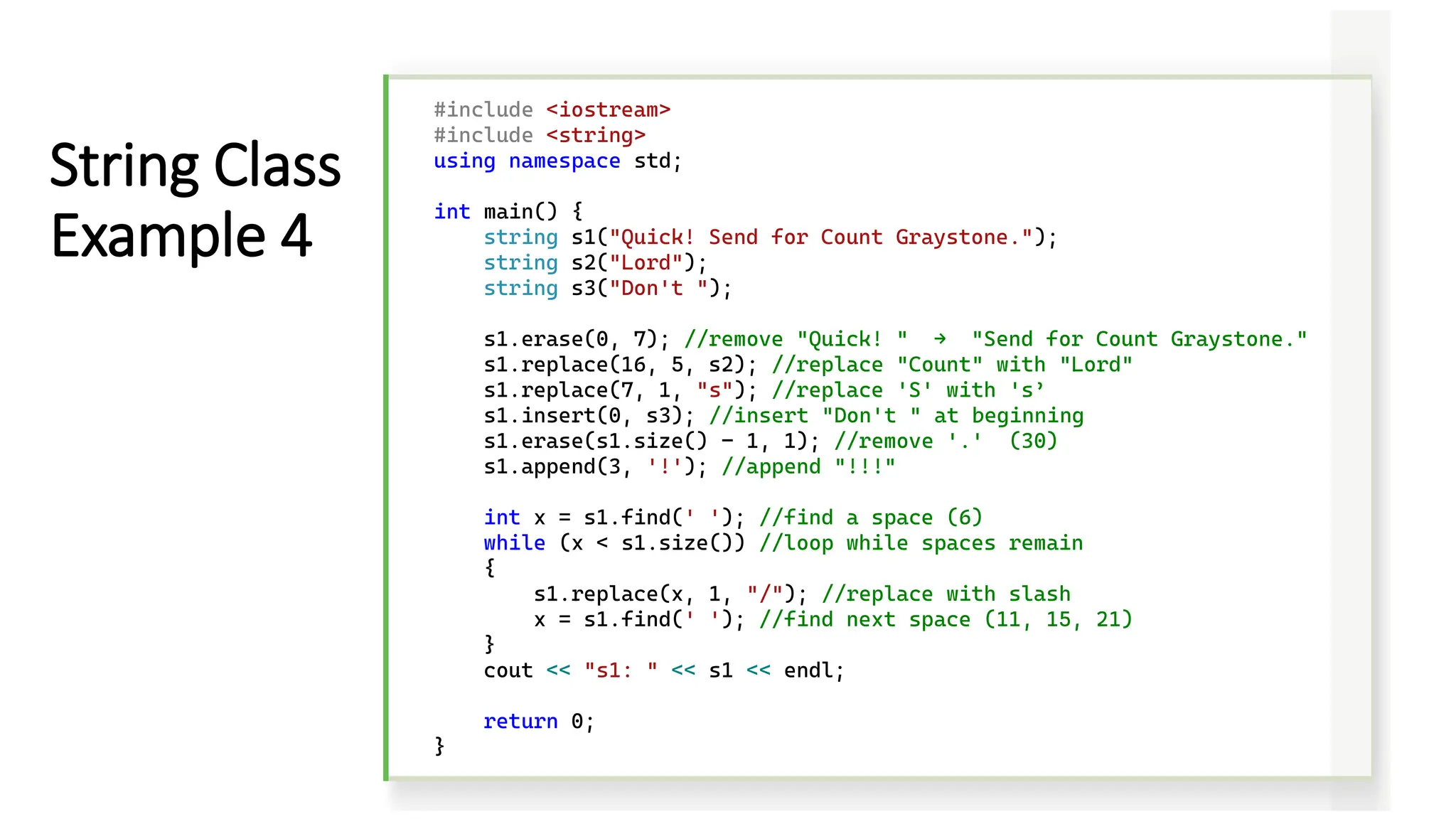
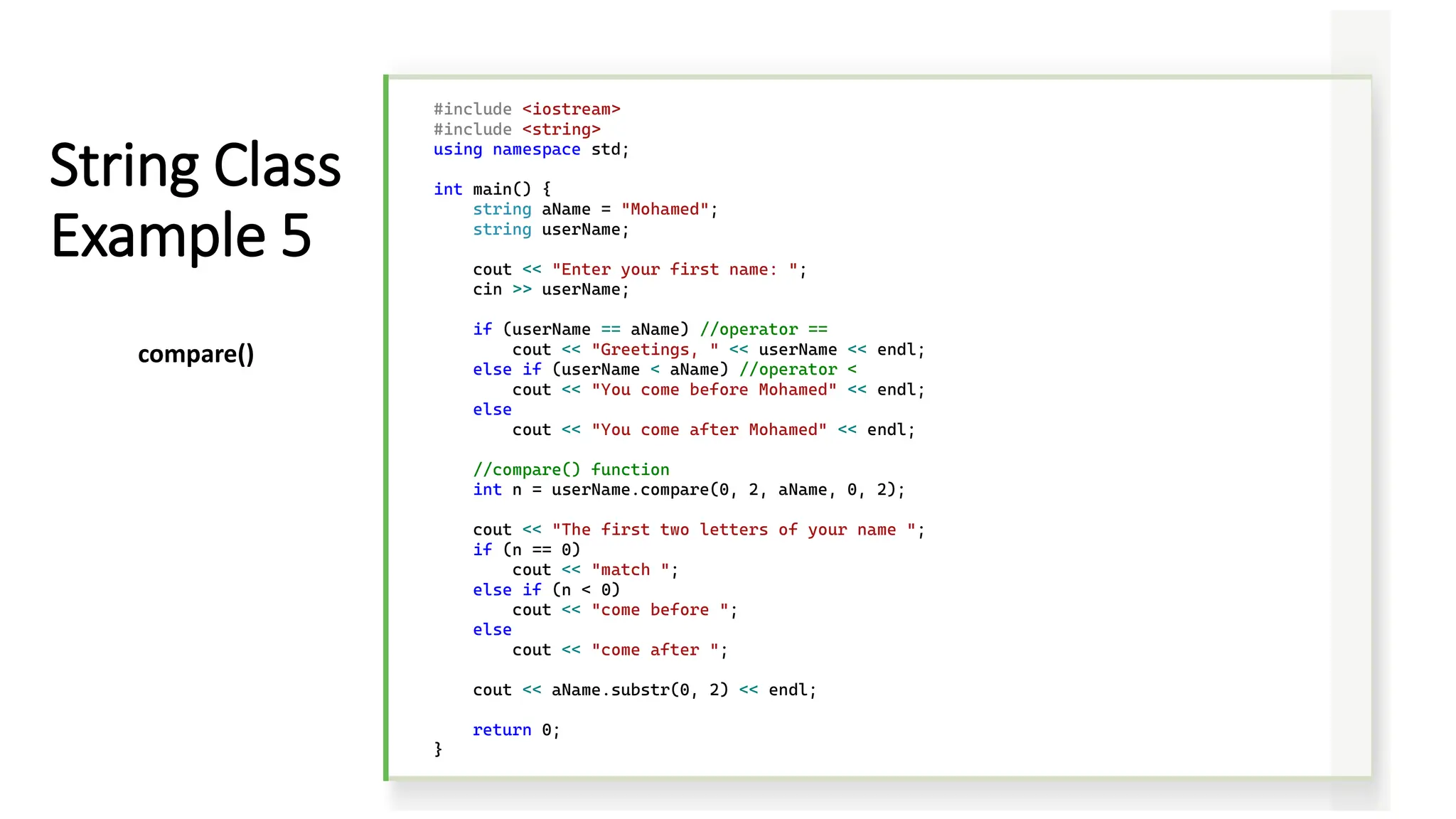
![#include <iostream>
#include <string>
using namespace std;
int main()
{
char charray[80];
string word;
cout << "Enter a word: ";
cin >> word;
//getline(cin, word);
int wlen = word.length(); //length of string object
// int wlen = word.size();
cout << "One character at a time: ";
for (int j = 0; j < wlen; j++)
cout << word.at(j); //exception if out-of-bounds
// cout << word[j]; //no warning if out-of-bounds
word.copy(charray, wlen, 0); //copy string object to array
charray[wlen] = 0; //terminate with ‘0’
cout << "nArray contains: " << charray << endl;
return 0;
}
String Class
Example 6
Accessing Characters
in string Objects using
the overloaded []
operator](https://image.slidesharecdn.com/oopusingclanguage-lecture2-240918193533-fa982da0/75/Object-Oriented-Programming-OOP-using-C-Lecture-2-20-2048.jpg)
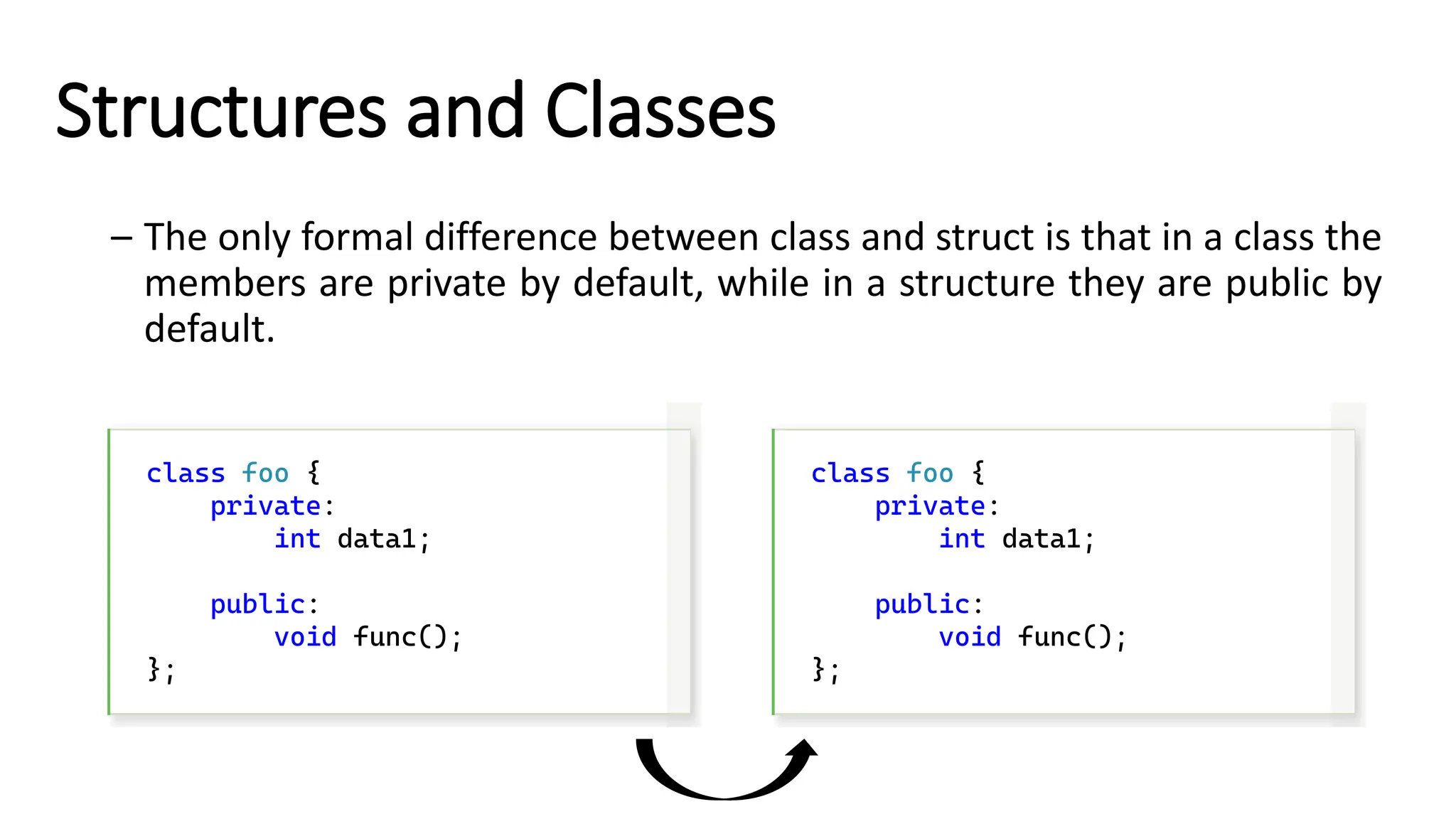
![#include <iostream>
using namespace std;
class Stack
{
private:
enum { MAX = 10 }; //(non-standard syntax)
int st[MAX]; //stack: array of integers
int top; //number of top of stack
public:
Stack() //constructor
{
top = 0;
}
void push(int var) //put number on stack
{
st[++top] = var;
}
int pop() //take number off stack
{
return st[top--];
}
};
int main()
{
Stack s1;
s1.push(11);
s1.push(22);
cout << "1: " << s1.pop() << endl; //22
cout << "2: " << s1.pop() << endl; //11
s1.push(33);
s1.push(44);
s1.push(55);
s1.push(66);
cout << "3: " << s1.pop() << endl; //66
cout << "4: " << s1.pop() << endl; //55
cout << "5: " << s1.pop() << endl; //44
cout << "6: " << s1.pop() << endl; //33
return 0;
}
Stack](https://image.slidesharecdn.com/oopusingclanguage-lecture2-240918193533-fa982da0/75/Object-Oriented-Programming-OOP-using-C-Lecture-2-22-2048.jpg)

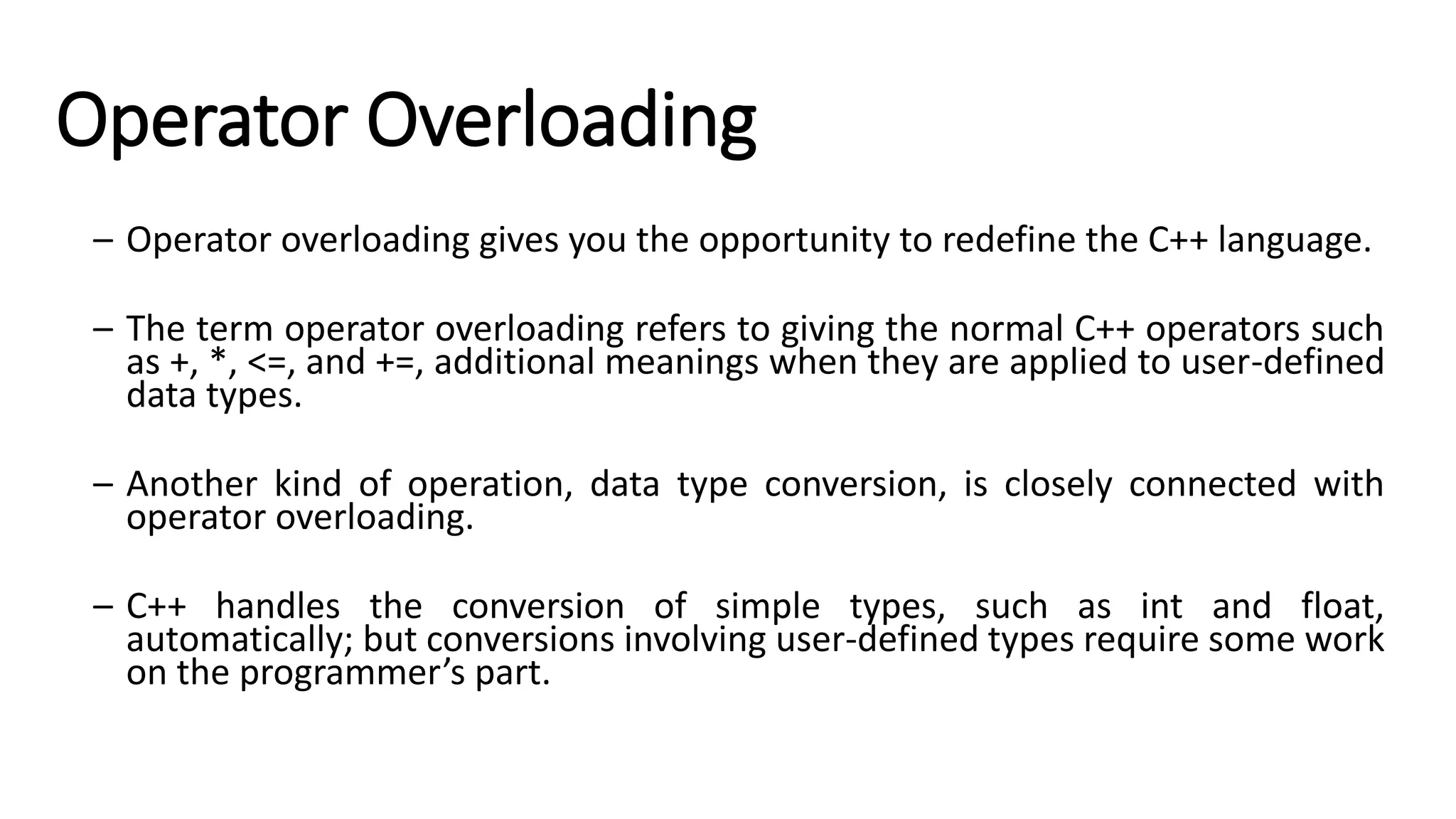
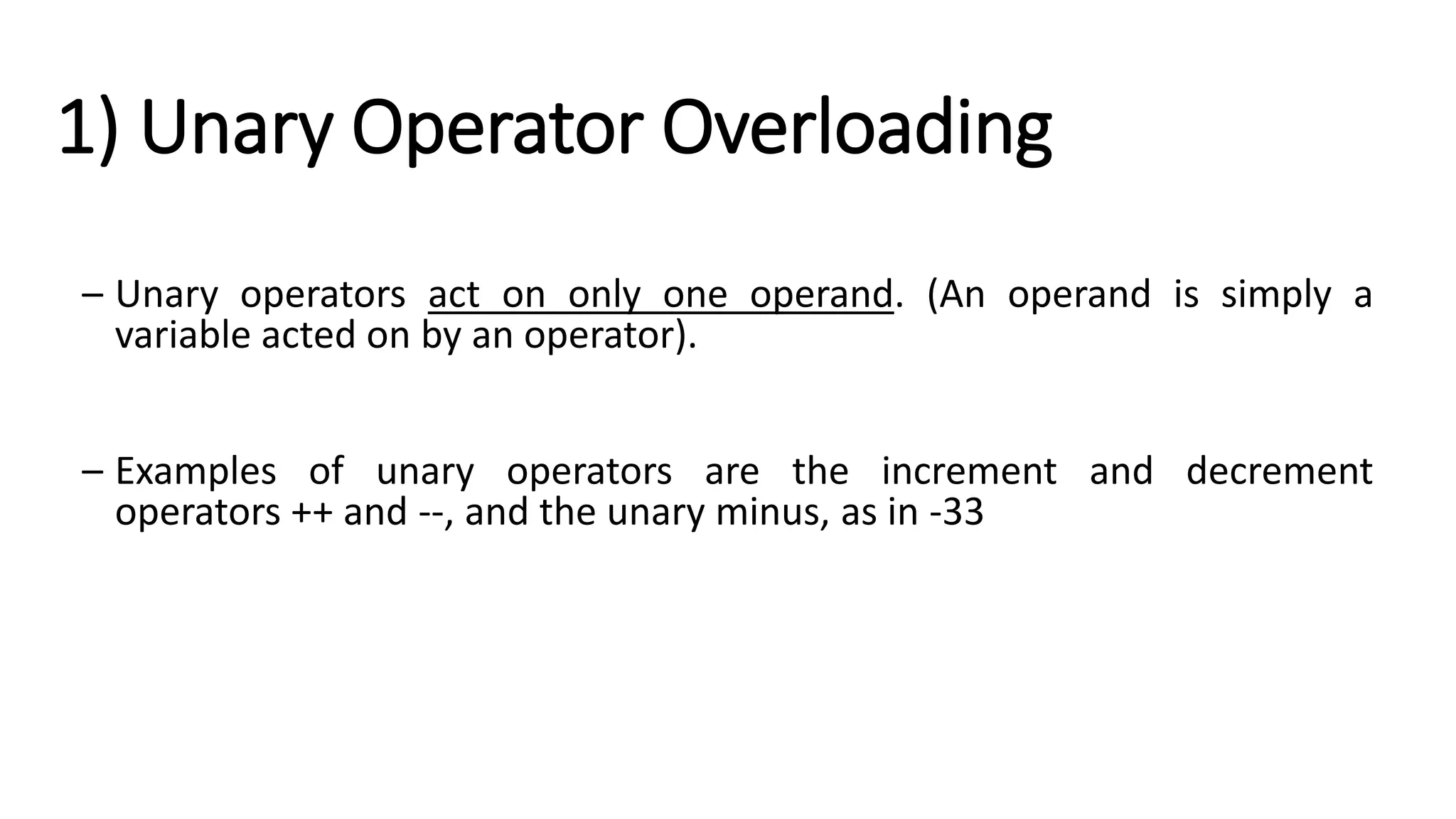
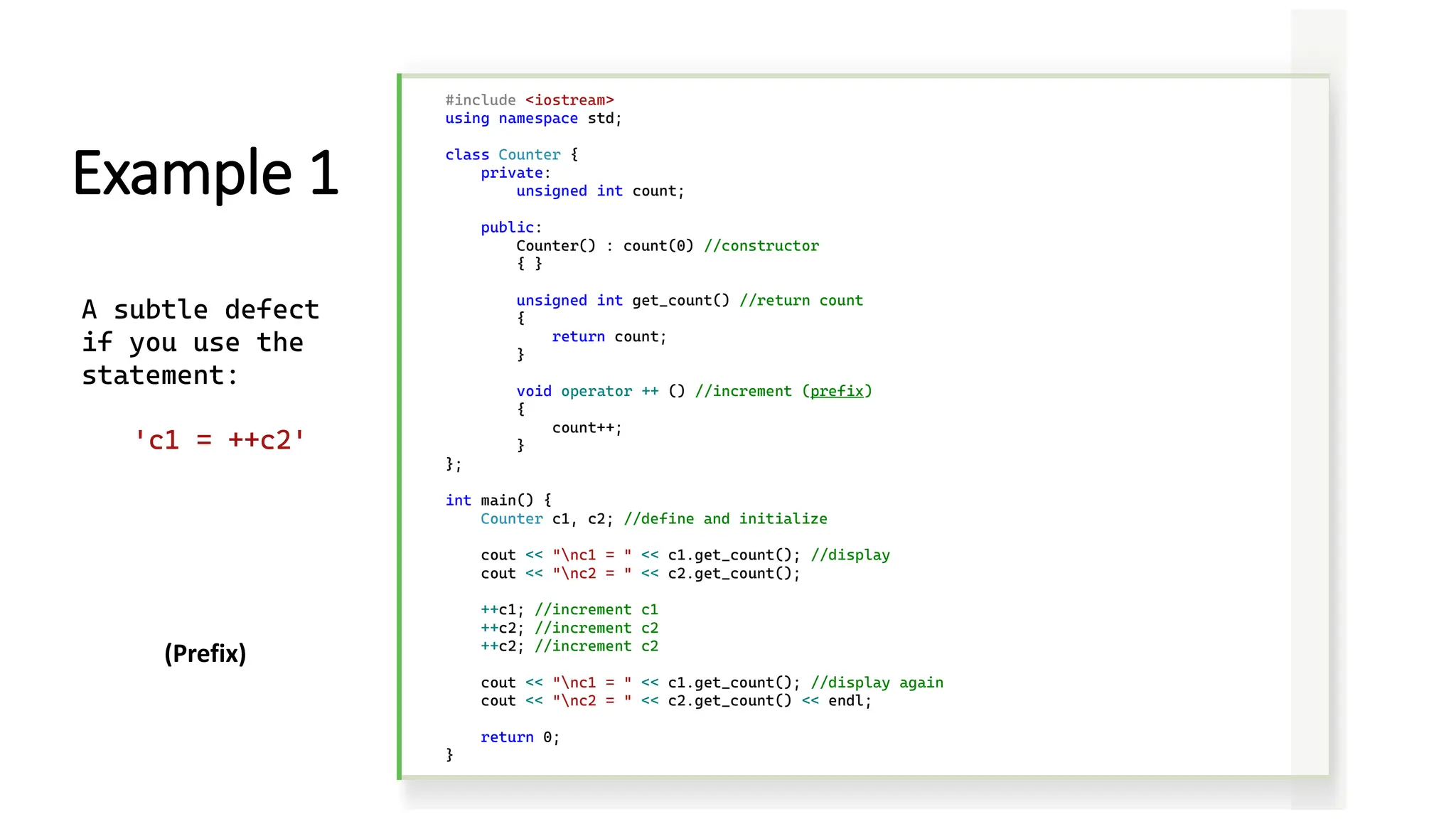
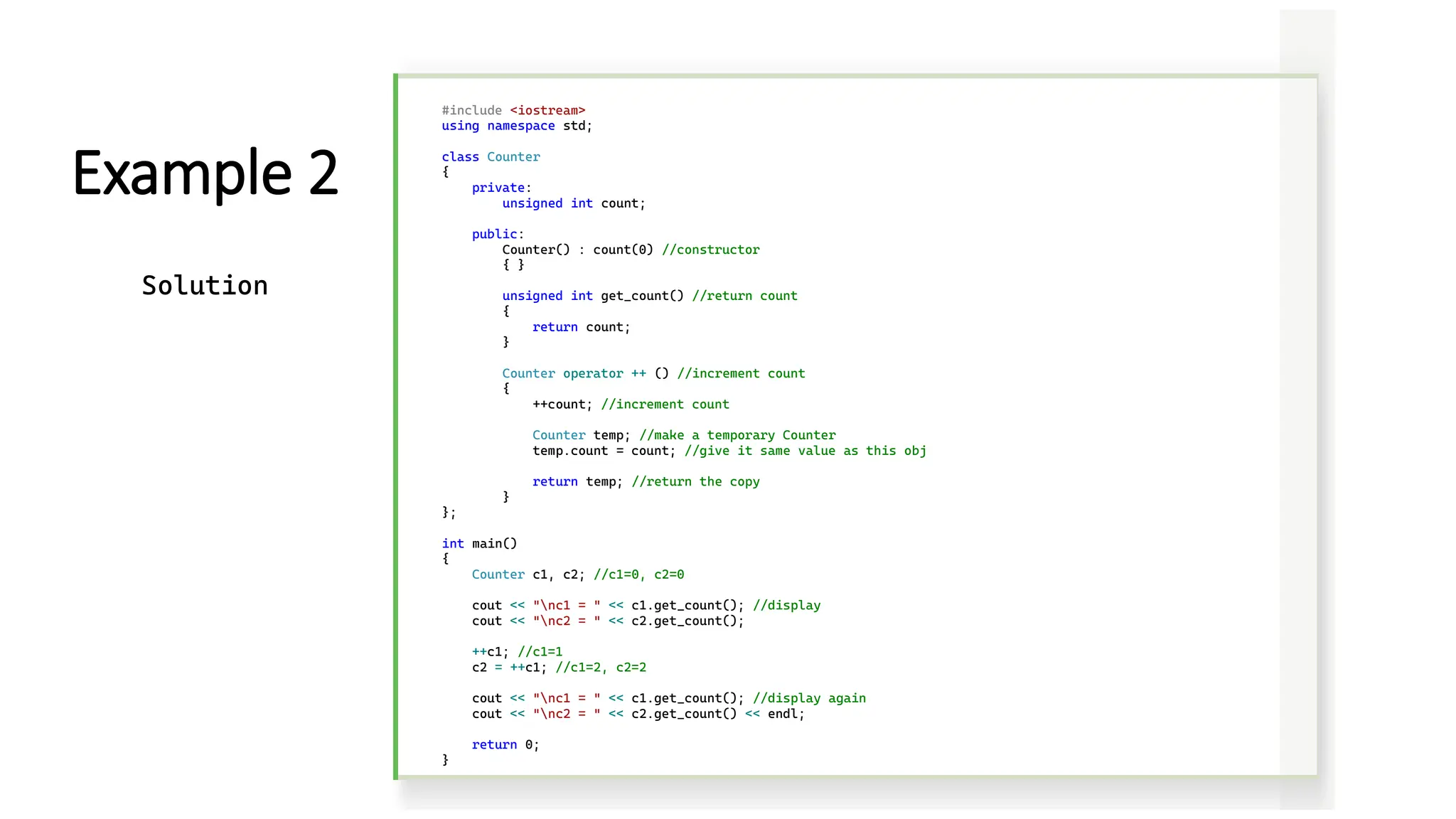
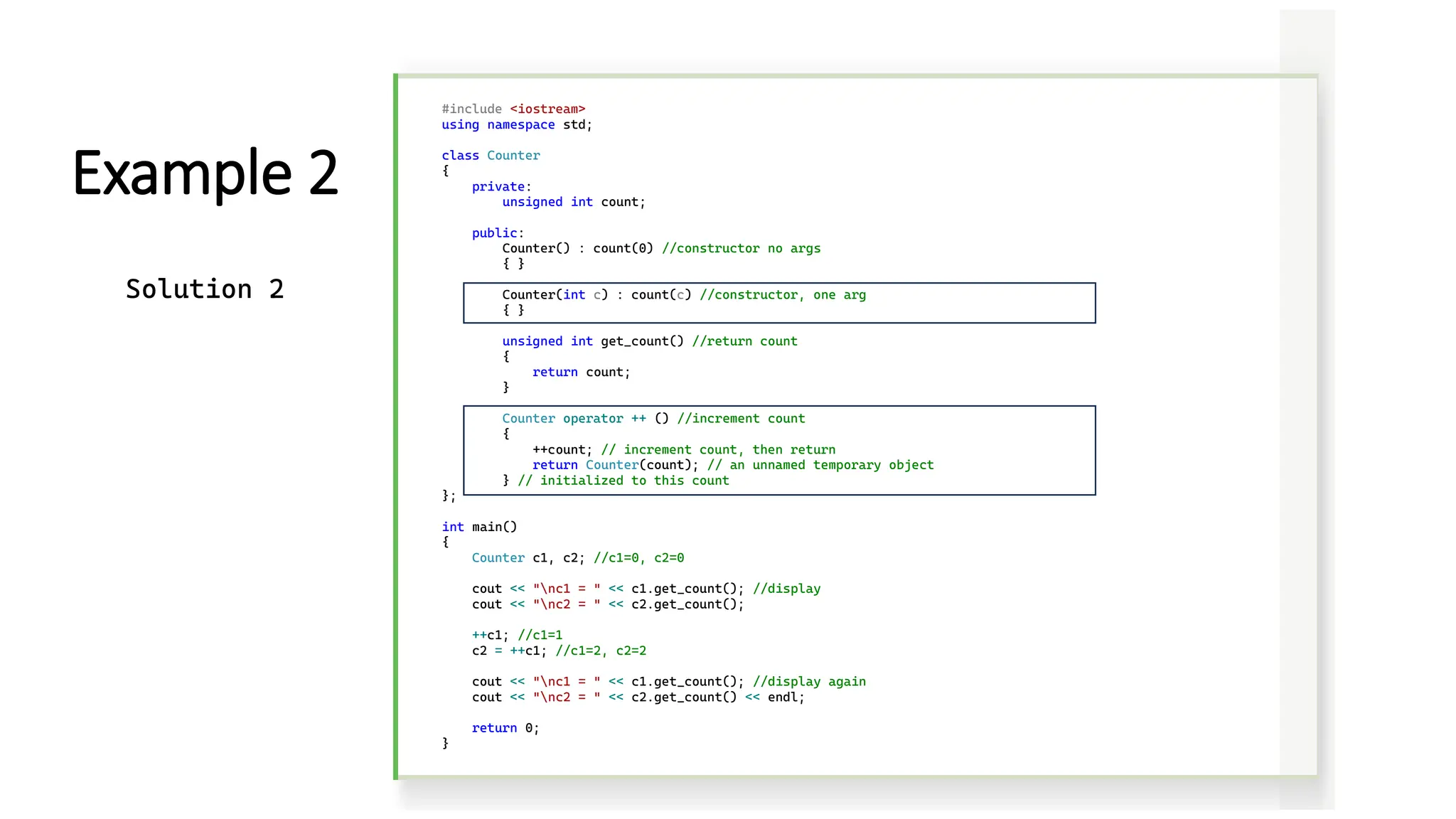
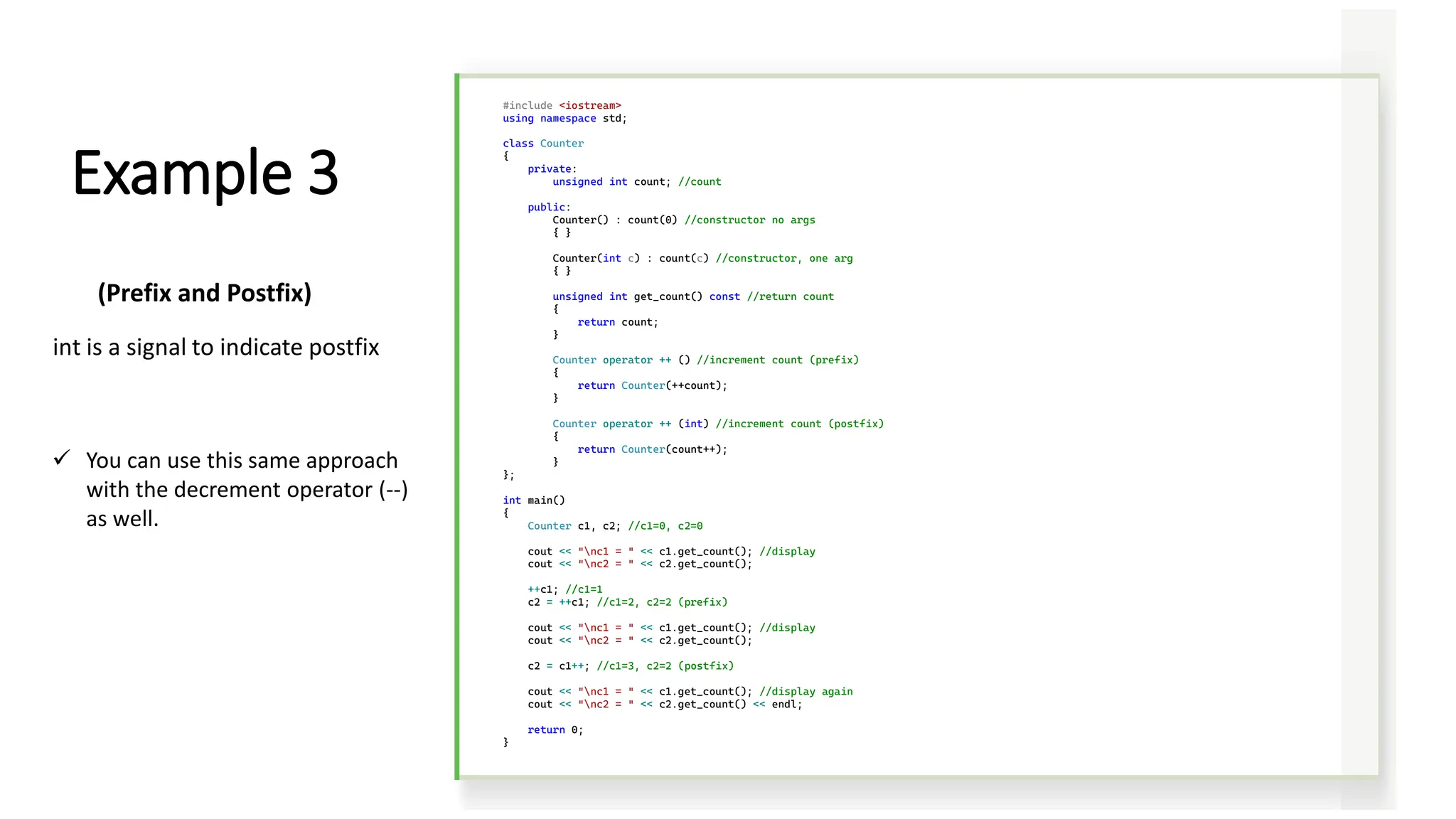
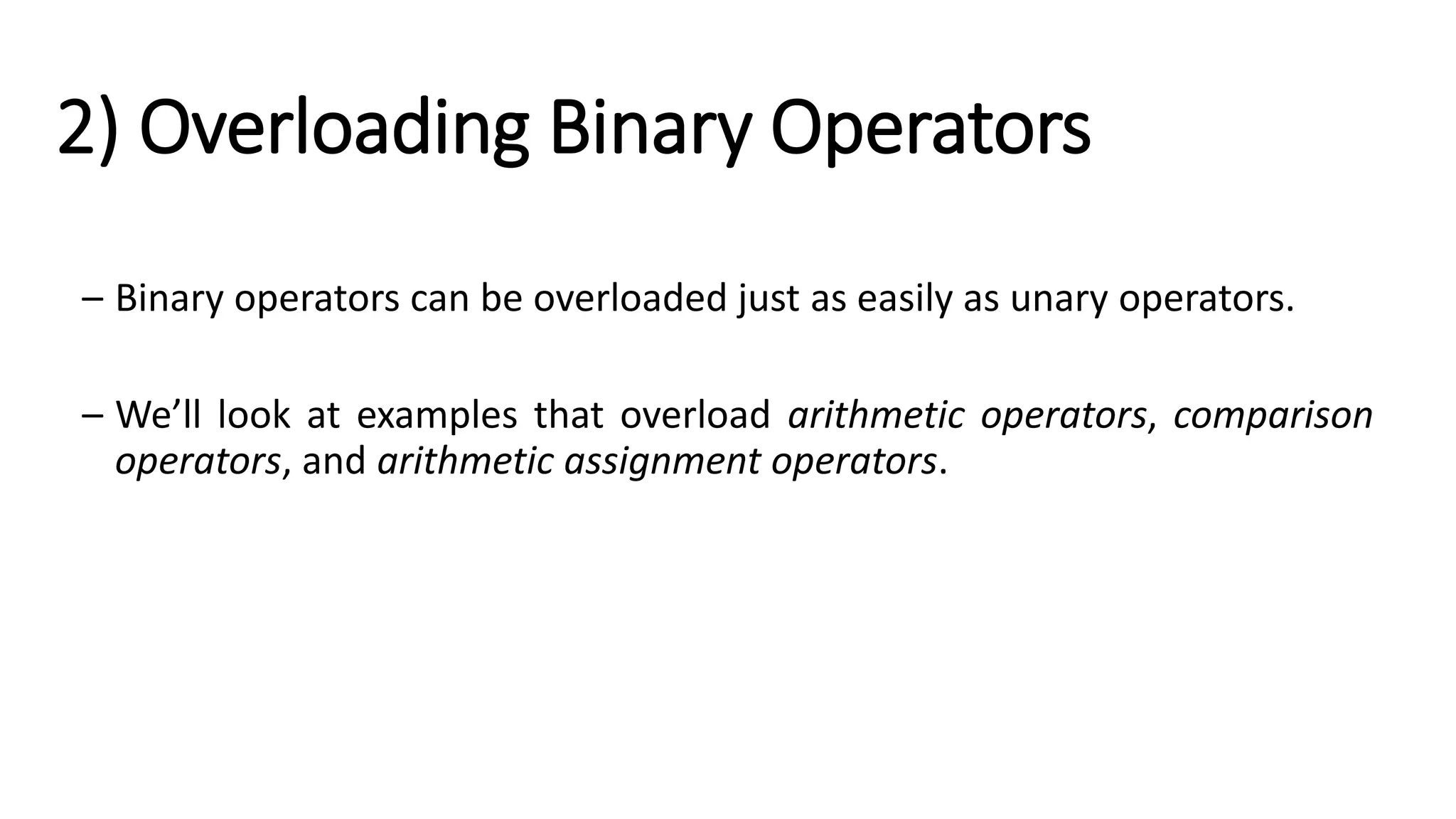
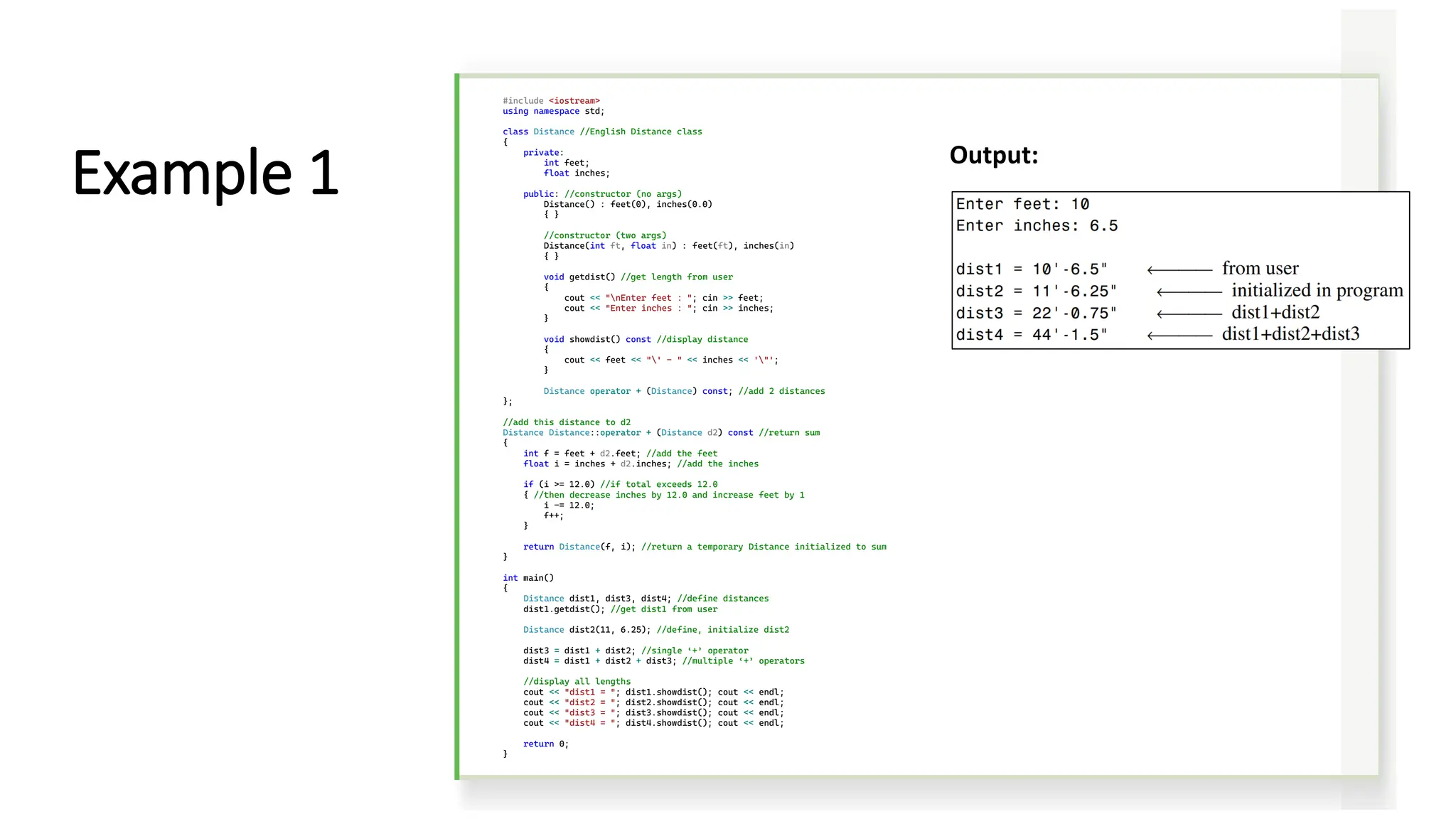
![#include <iostream>
#include <string.h> //for strcpy(), strcat()
#include <stdlib.h> //for exit()
using namespace std;
class String //user-defined string type
{
private:
enum { SZ = 80 }; //size of String objects
char str[SZ]; //holds a string
public:
String() //constructor, no args
{
strcpy(str, "");
}
String(char s[]) //constructor, one arg
{
strcpy(str, s);
}
void display() const //display the String
{
cout << str;
}
String operator + (String ss) const //add Strings
{
String temp; //make a temporary String
if (strlen(str) + strlen(ss.str) < SZ)
{
strcpy(temp.str, str); //copy this string to temp
strcat(temp.str, ss.str); //add the argument string
}
else
{
cout << "nString overflow"; exit(1);
}
return temp; //return temp String
}
};
int main()
{
String s1 = "nHello, Mohamed!"; //uses constructor 2
String s2 = "Welcome abroad."; //uses constructor 2
String s3; //uses constructor 1
s1.display(); //display strings
s2.display();
s3.display();
s3 = s1 + s2; //add s2 to s1, assign to s3
s3.display(); //display s3
return 0;
}
Example 2
(String Class)](https://image.slidesharecdn.com/oopusingclanguage-lecture2-240918193533-fa982da0/75/Object-Oriented-Programming-OOP-using-C-Lecture-2-32-2048.jpg)
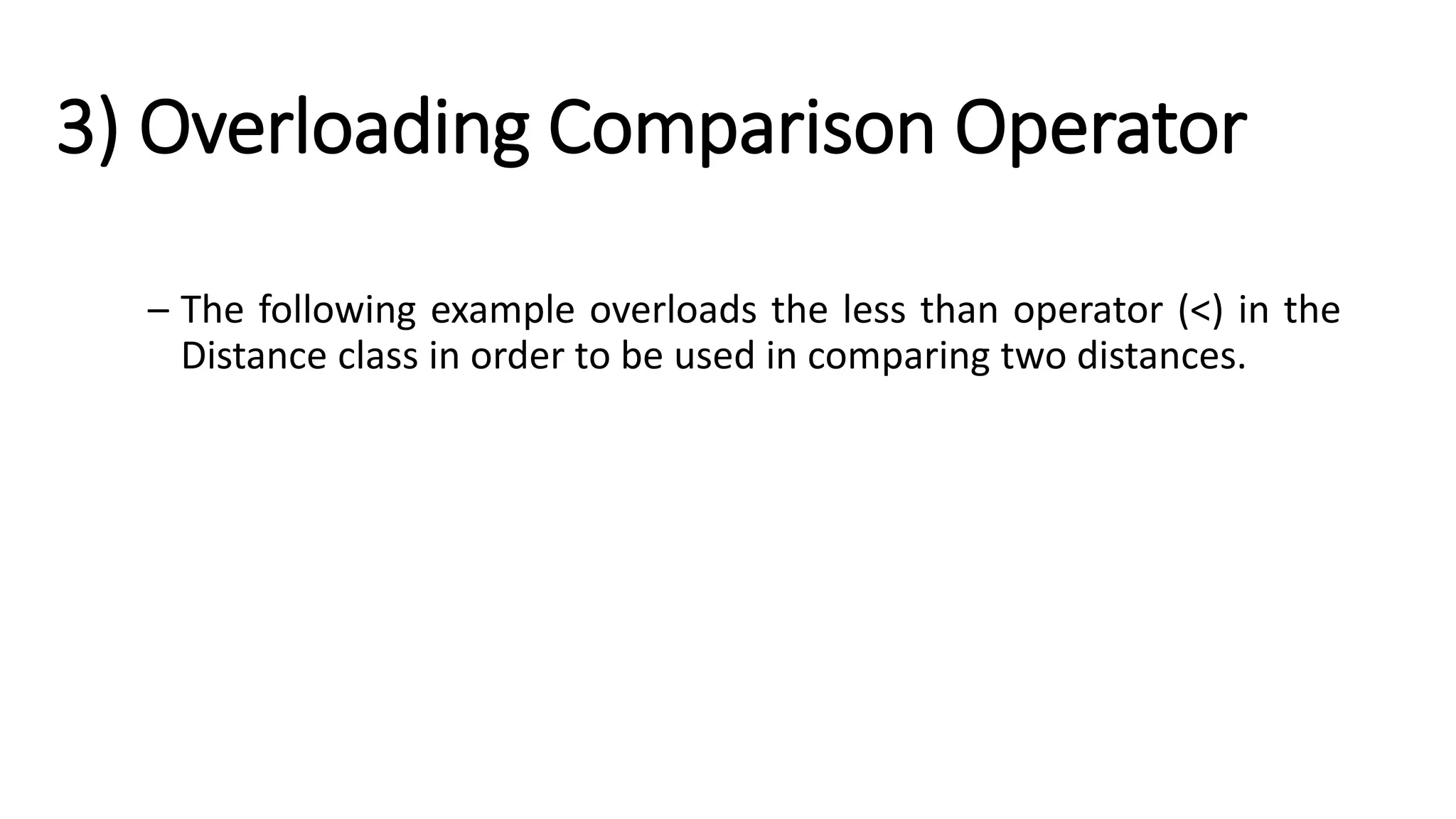
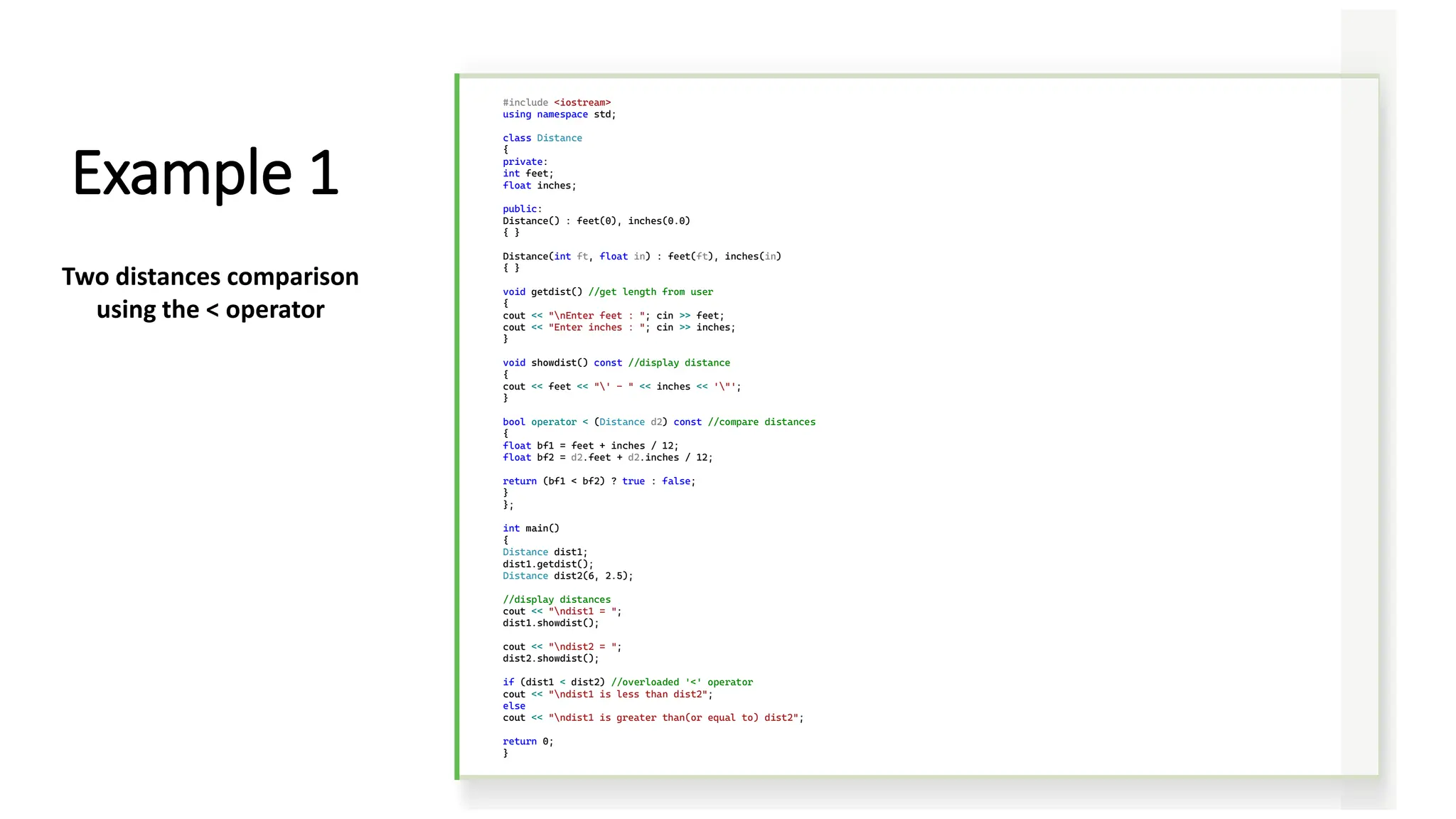
![#include <iostream>
#include <string.h> //for strcmp()
using namespace std;
class String //user-defined string type
{
private:
enum { SZ = 80 }; //size of String objects
char str[SZ]; //holds a string
public:
String() {
strcpy(str, "");
}
String(char s[]) {
strcpy(str, s);
}
void display() const //display a String
{
cout << str;
}
void getstr() //read a string
{
cin.get(str, SZ);
}
bool operator == (String ss) const //check for equality
{
return (strcmp(str, ss.str) == 0) ? true : false;
}
};
int main()
{
String s1 = "yes";
String s2 = "no";
String s3;
cout << "nEnter 'yes' or 'no': ";
s3.getstr(); //get String from user
if (s3 == s1) //compare with "yes"
cout << "You typed 'yes'.n";
else if (s3 == s2) //compare with "no"
cout << "You typed 'no'.n";
else
cout << "You didn't follow instructions.n";
return 0;
}
Example 2
String Comparison using
== operator](https://image.slidesharecdn.com/oopusingclanguage-lecture2-240918193533-fa982da0/75/Object-Oriented-Programming-OOP-using-C-Lecture-2-35-2048.jpg)
![#include <iostream>
#include <string.h> //for strlen()
using namespace std;
class String {
private:
enum { SZ = 80 };
char str[SZ];
public:
String() {
strcpy(str, "");
}
String(char s[]) {
strcpy(str, s);
}
void display() const {
cout << str;
}
void getstr() {
cin.get(str, SZ);
}
bool operator < (String ss) const {
return strlen(str) < strlen(ss.str);
}
};
int main() {
String s1 = "Mohamed";
String s2 = "Ahmed";
if (s1 < s2) {
cout << "The length of ";
s1.display();
cout << " is less than ";
s2.display();
} else {
cout << "The length of ";
s1.display();
cout << " is greater than ";
s2.display();
}
return 0;
}
Example 3
String Comparison using
< operator](https://image.slidesharecdn.com/oopusingclanguage-lecture2-240918193533-fa982da0/75/Object-Oriented-Programming-OOP-using-C-Lecture-2-36-2048.jpg)
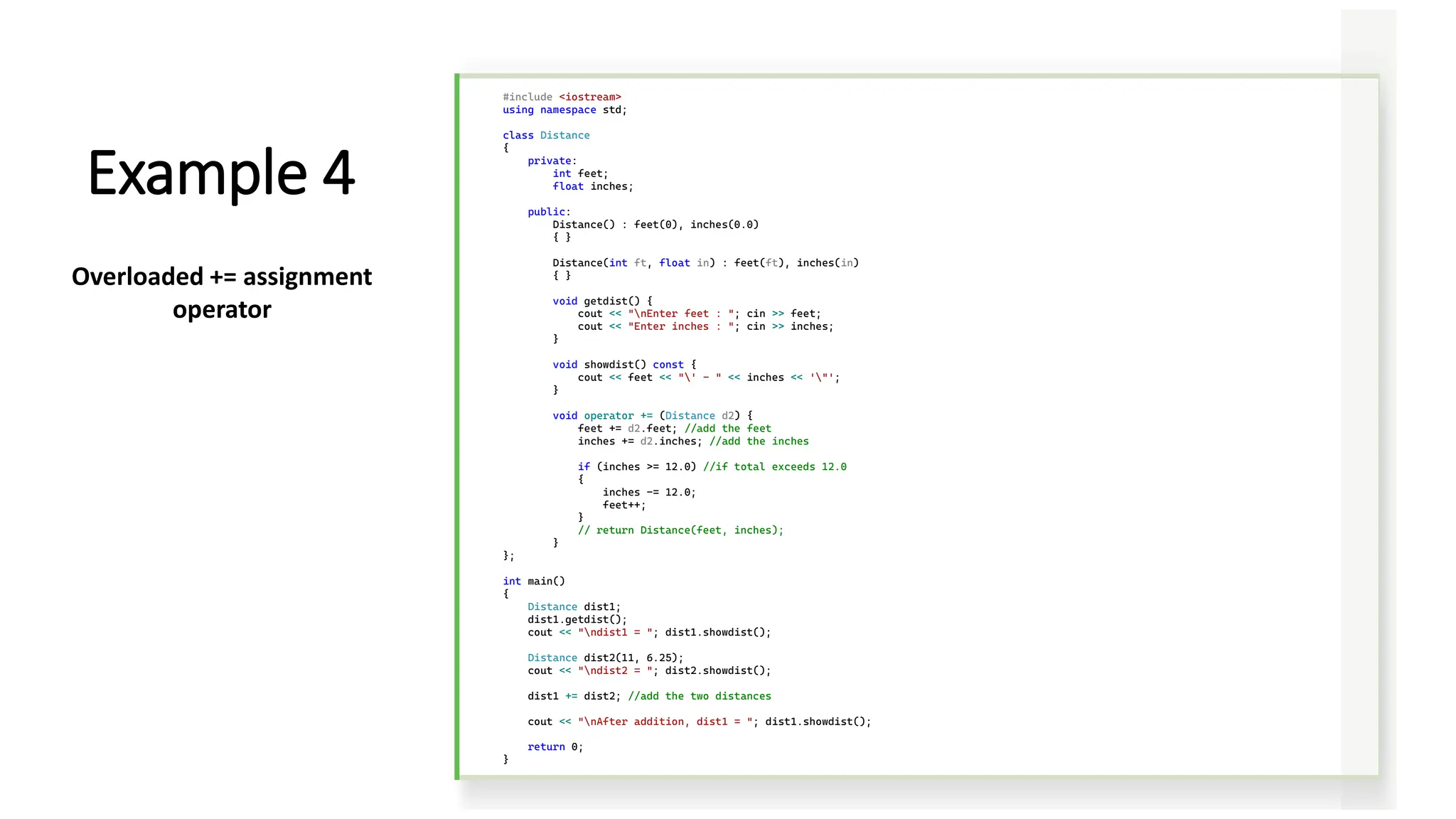
![#include <iostream>
#include <process.h> // for exit()
using namespace std;
const int LIMIT = 5;
class safearay
{
private:
int arr[LIMIT];
public:
void putel(int n, int elvalue) //set value of element
{
if (n < 0 || n >= LIMIT) {
cout << "Index out of bounds.";
exit(1);
}
arr[n] = elvalue;
}
int getel(int n) const //get value of element
{
if (n < 0 || n >= LIMIT)
{
cout << "Index out of bounds.";
exit(1);
}
return arr[n];
}
};
int main()
{
safearay sa1;
for (int i = 0; i < LIMIT; i++) // insert elements
sa1.putel(i, i * 10);
for (int i = 0; i < LIMIT; i++) // display elements
cout << "Element " << i << " is " << sa1.getel(i) << endl;
return 0;
}
Safe Array
Class
Example 1](https://image.slidesharecdn.com/oopusingclanguage-lecture2-240918193533-fa982da0/75/Object-Oriented-Programming-OOP-using-C-Lecture-2-38-2048.jpg)
![#include <iostream>
#include <process.h> //for exit()
using namespace std;
const int LIMIT = 5; //array size
class safearay
{
private:
int arr[LIMIT];
public:
int& operator [] (int n) //note: return by reference
{
if (n < 0 || n >= LIMIT)
{
cout << "Index out of bounds.";
exit(1);
}
return arr[n];
}
};
int main()
{
safearay sa1;
for (int i = 0; i < LIMIT; i++) //insert elements
sa1[i] = i * 10;
for (int i = 0; i < LIMIT; i++) //display elements
cout << "Element " << i << " is " << sa1[i] << endl;
return 0;
}
Safe Array
Class
Example 2
Overloading the subscript [ ]
operator](https://image.slidesharecdn.com/oopusingclanguage-lecture2-240918193533-fa982da0/75/Object-Oriented-Programming-OOP-using-C-Lecture-2-39-2048.jpg)
